JAK/STAT Signaling

Targets for JAK/STAT Signaling
Products for JAK/STAT Signaling
- Cat.No. Product Name Information
-
GC38006
β-Hydroxyisovalerylshikonin
Beta-hydroxyisovalerylshikonin is a natural product isolated from Lithospermium radix, acts as a potent inhibitor of protein tyrosine kinases (PTK), with IC50s of 0.7μM and 1μM for EGFR and v-Src receptor, respectively. Beta-hydroxyisovalerylshikonin is effective against a wide variety of tumor cell lines, and most efficiently induces cell-death in NCI-H522 and DMS114 cells.
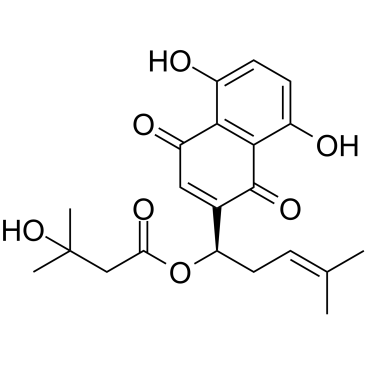
-
GC34964
(1S,3R,5R)-PIM447 dihydrochloride
(1S,3R,5R)-LGH447 dihydrochloride
(1S,3R,5R)-PIM447 (dihydrochloride) an PIM inhibitor extracted from patent US 20100056576 A1, compound example 72, has IC50 values of 0.095 μM for Pim1, 0.522 μM for Pim2 and 0.369 μM for Pim3.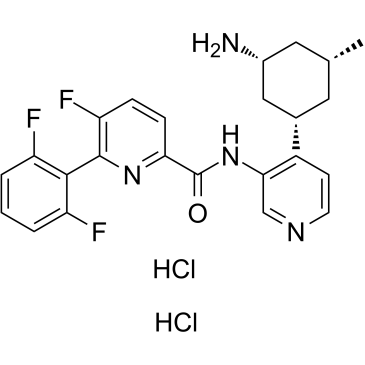
-
GC34971
(3R,4S)-Tofacitinib
(3R,4S)-Tofacitinib is an less active enantiomer of Tofacitinib.
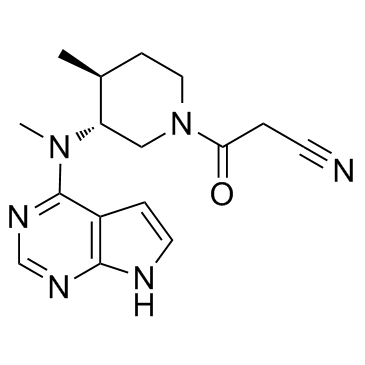
-
GC34972
(3S,4R)-Tofacitinib
(3S,4R)-Tofacitinib is an less active enantiomer of Tofacitinib.
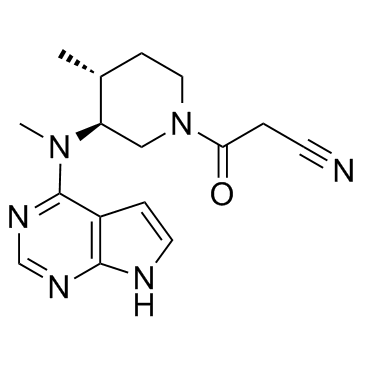
-
GC34973
(3S,4S)-Tofacitinib
(3S,4S)-Tofacitinib is the less active S-enantiomer of Tofacitinib.
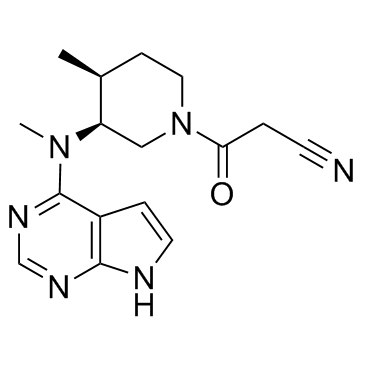
-
GC61807
(E/Z)-AG490
(E/Z)-AG490 ((E/Z)-Tyrphostin AG490) is a racemic compound of (E)-AG490 and (Z)-AG490 isomers. (E)-AG490 is a tyrosine kinase inhibitor that inhibits EGFR, Stat-3 and JAK2/3.

-
GC63864
(E/Z)-Zotiraciclib hydrochloride
(E/Z)-TG02 hydrochloride; (E/Z)-SB1317 hydrochloride
(E/Z)-Zotiraciclib ((E/Z)-TG02) hydrochloride is a potent CDK2, JAK2, and FLT3 inhibitor.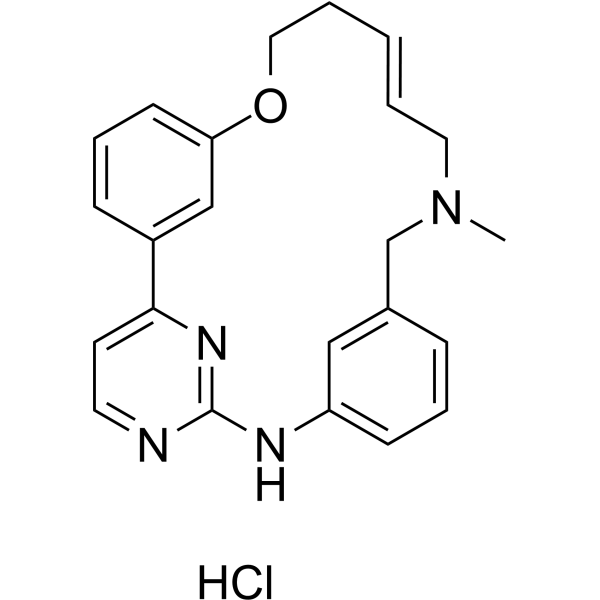
-
GC69836
(R,R)-VVD-118313
(R,R)-VVD-118313 is an isomer of VVD-118313. VVD-118313 is a selective JAK1 inhibitor that can block JAK1-dependent phosphorylation and cytokine signaling. VVD-118313 can be used for cancer research.

-
GC63797
(S)-Sunvozertinib
(S)-DZD9008
(S)-Sunvozertinib ((S)-DZD9008), the S-enantiomer of Sunvozertinib, shows inhibitory activity against EGFR exon 20 NPH and ASV insertions, EGFR L858R/T790M mutation and Her2 exon20 YVMA insertion (IC50=51.2 nM, 51.9 nM, 1 nM, and 21.2 nM, respectively). (S)-Sunvozertinib also inhibits BTK.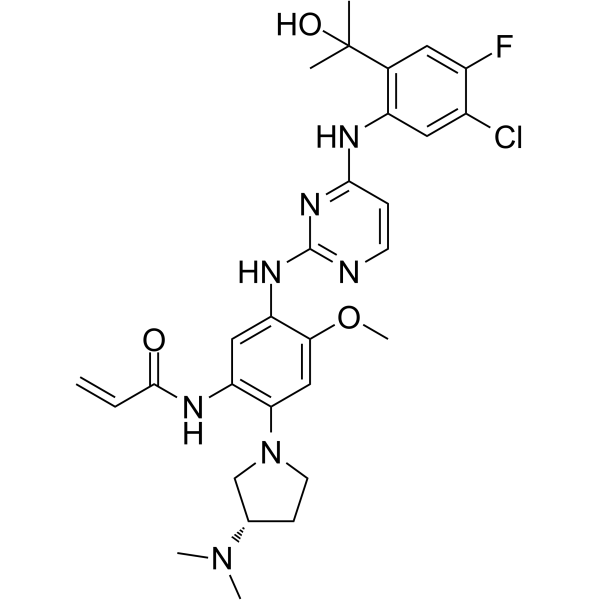
-
GC46503
2-(1,8-Naphthyridin-2-yl)phenol
2-NP
2-(1,8-Naphthyridin-2-yl)phenol is a selective enhancer of STAT1 transcription. 2-(1,8-Naphthyridin-2-yl)phenol can enhance the ability of IFN-γ to inhibit the proliferation of human breast cancer and fibrosarcoma cells.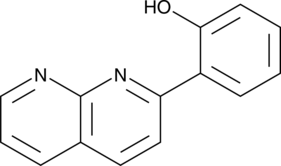
-
GC12138
5,15-DPP
5,15-Diphenylporphyrin,STAT3 Inhibitor VIII
5,15-DPP (5,15-DPP) is a selective STAT3-SH2 antagonist (IC50s of 0.28 μM and 10 μM for STAT3 and STAT1, respectively).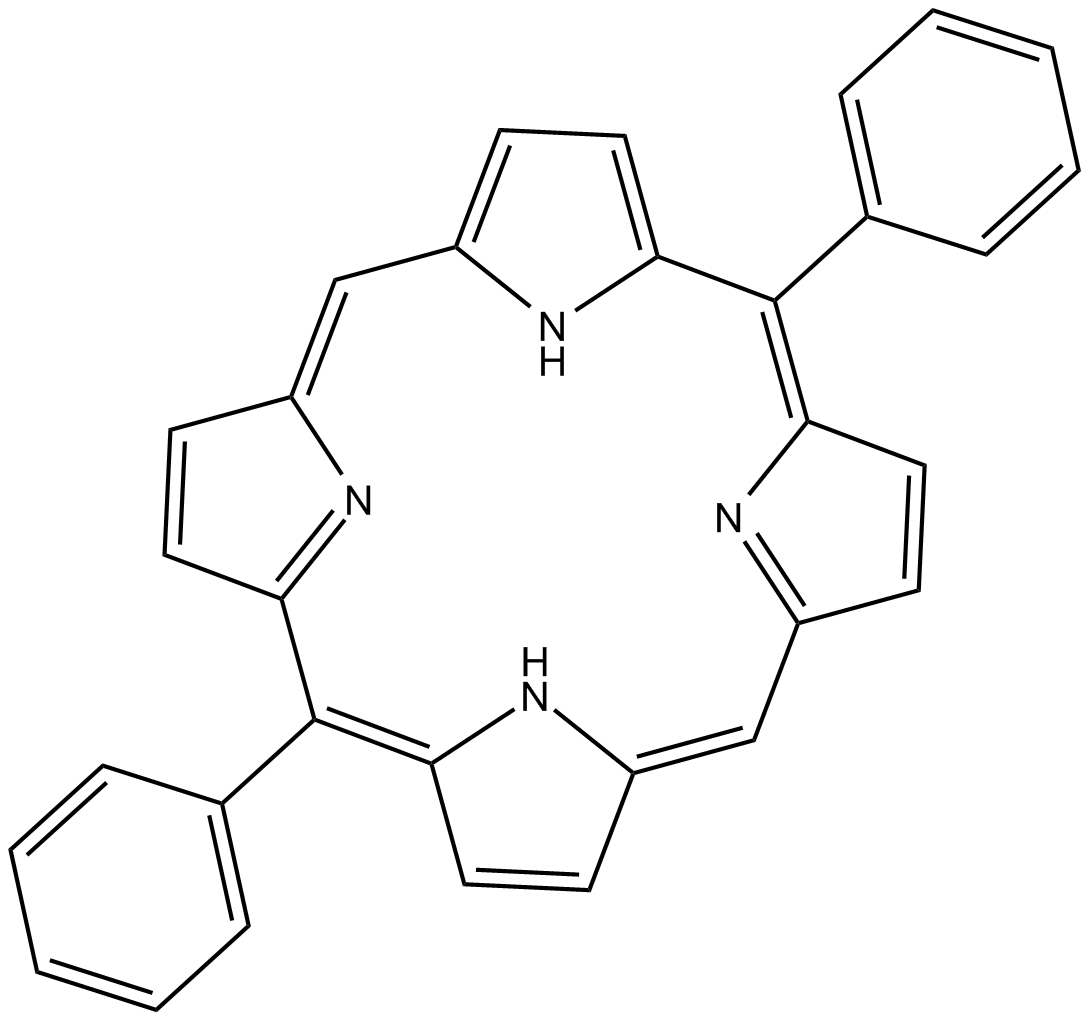
-
GC32023
Abrocitinib (PF-04965842)
PF-04965842
Abrocitinib (PF-04965842) (PF-04965842) is a potent, orally active and selective JAK1 inhibitor, with IC50s of 29 and 803 nM for JAK1 and JAK2, respectively.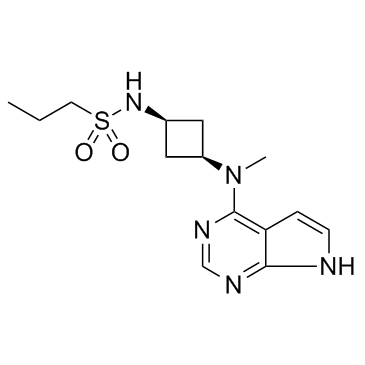
-
GC62272
AC-4-130
AC-4-130 is a potent STAT5 SH2 domain inhibitor. AC-4-130 directly binds to STAT5 and disrupts STAT5 activation, dimerization, nuclear translocation, and STAT5-dependent gene transcription. AC-4-130 induces cell cycle arrest and apoptosis in FLT3-ITD-driven leukemic cells. AC-4-130 has anti-cancer activity and can efficiently block pathological levels of STAT5 activity in acute myeloid leukemia (AML).
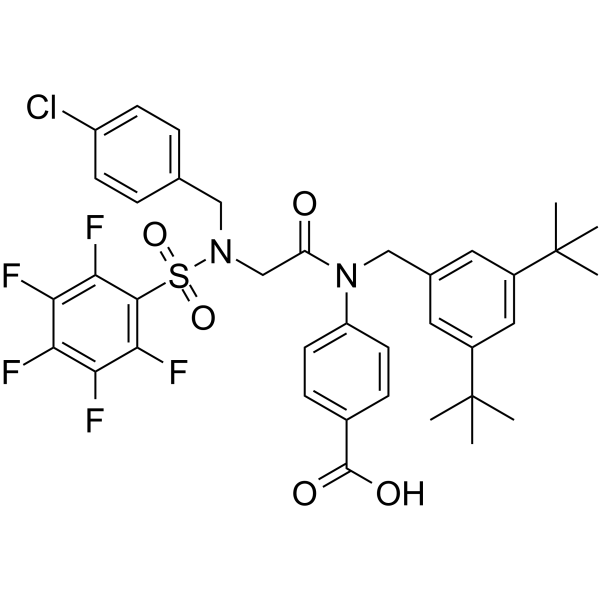
-
GC13257
AC480 (BMS-599626)
BMS-599626
AC480 (BMS-599626) (AC480) is a selective and orally bioavailable HER1 and HER2 inhibitor, with IC50s of 20 and 30 nM, respectively. AC480 (BMS-599626) displays ~8-fold less potent to HER4 (IC50=190 nM), >100-fold to VEGFR2, c-Kit, Lck, MEK. AC480 (BMS-599626) inhibits tumor cell proliferation, and has potential to increase tumor response to radiotherapy.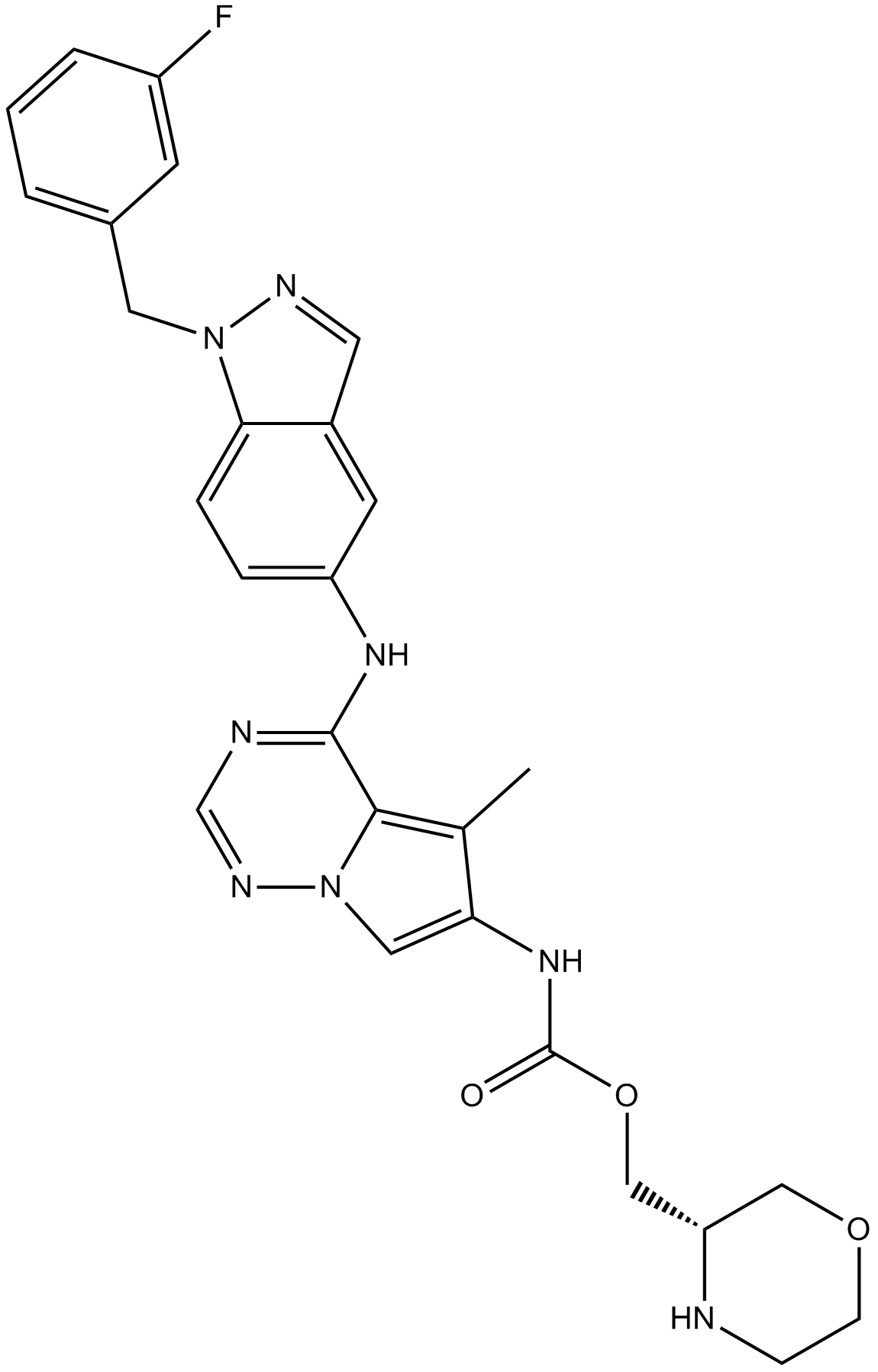
-
GC11892
AEE788 (NVP-AEE788)
NVP-AEE788
AEE788 (NVP-AEE788) is an inhibitor of the EGFR and ErbB2 with IC50 values of 2 and 6 nM, respectively.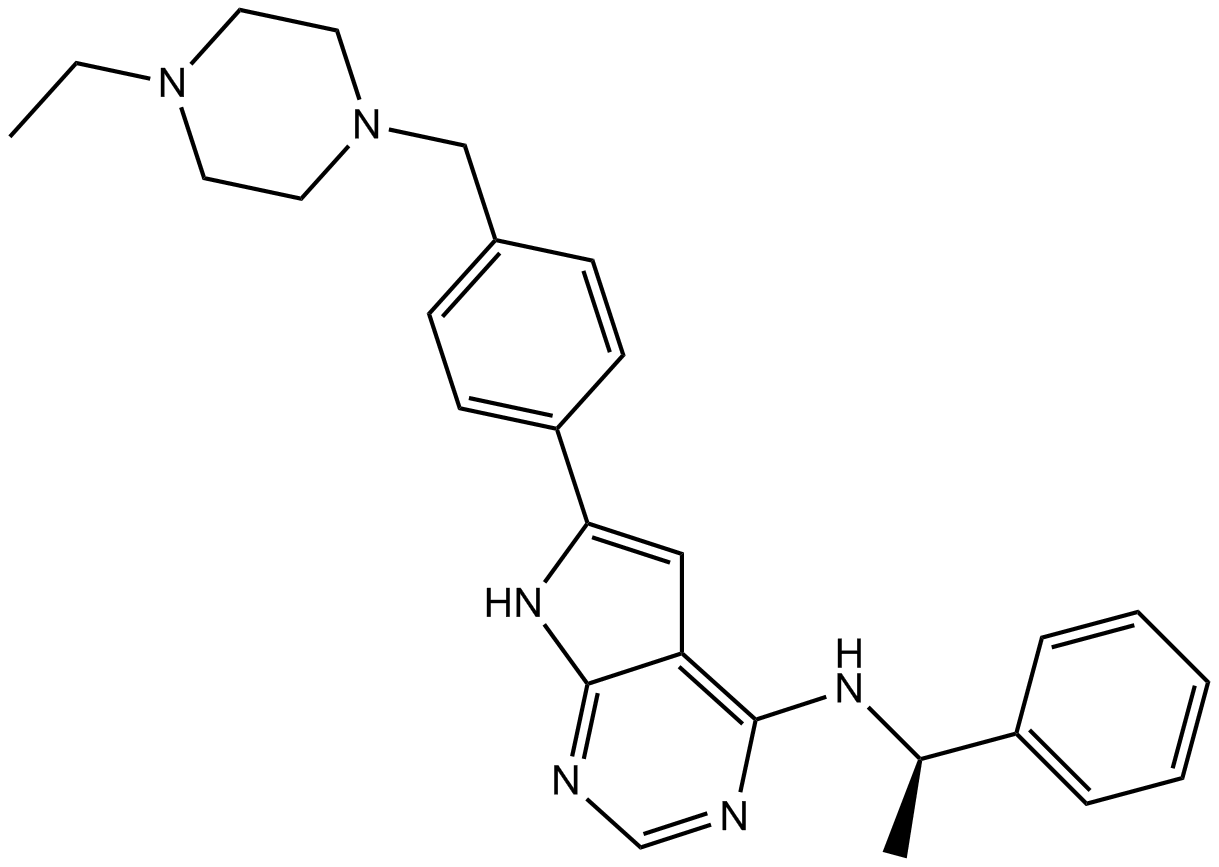
-
GC11744
AG 555
Tyrphostin AG-555, Tyrphostin B46
Potent EGFR-kinase inhibitor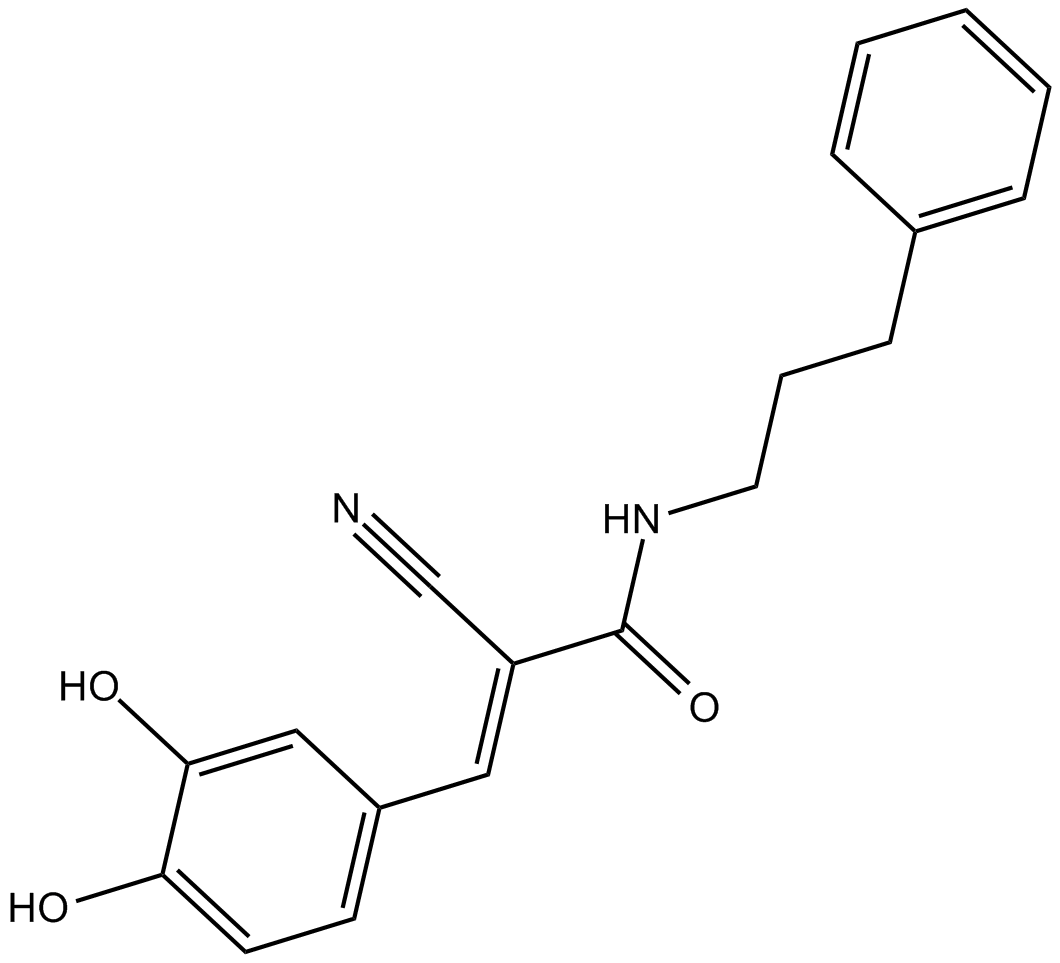
-
GC13168
AG 825
Tyrphostin AG825
Selective ErbB2 inhibitor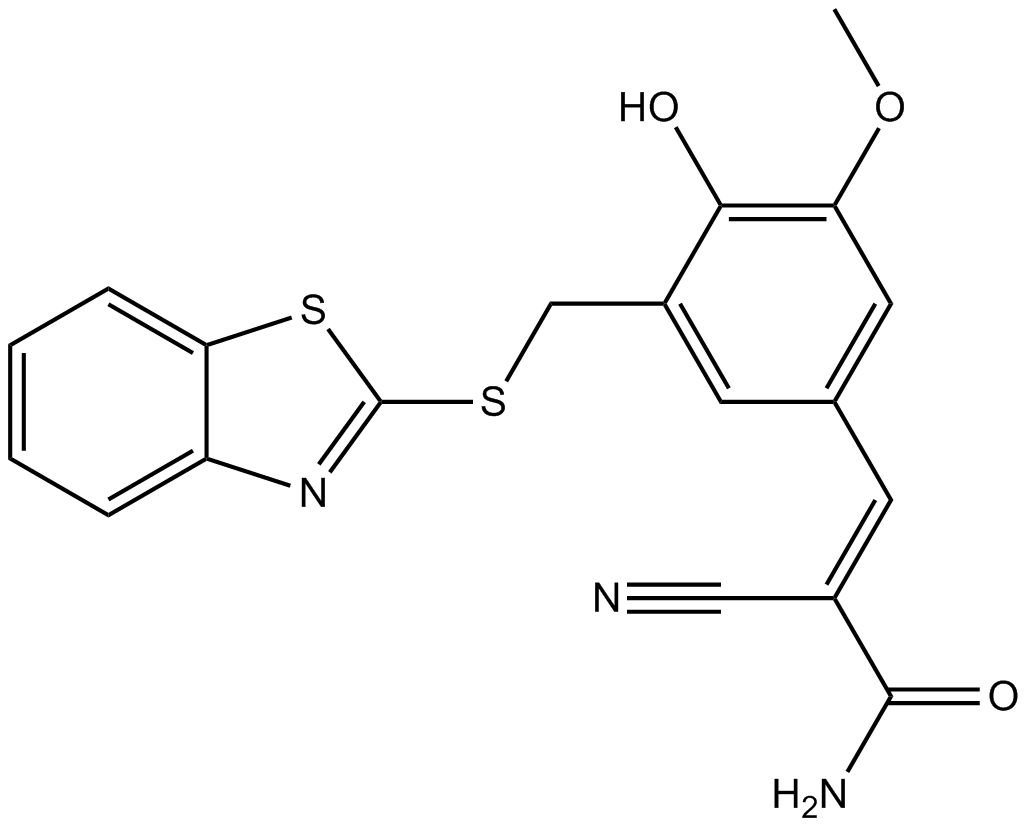
-
GC14494
AG 99
Tyrphostin 46, Tyrphostin AG-99
AG 99 ((E)-Tyrphostin 46) is a potent EGFR inhibitor.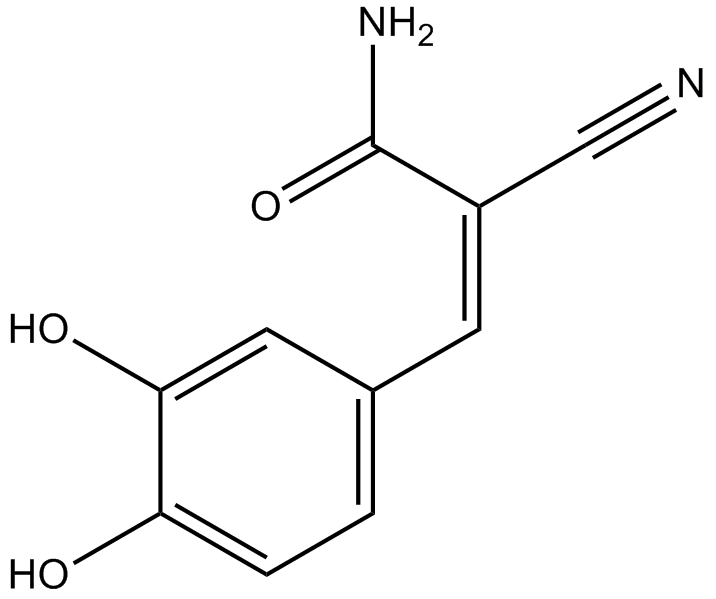
-
GC17226
AG-1478
Tyrphostin AG-1478; AG 1478; NSC 693255; AG1478
EGFR inhibitor,potent and selective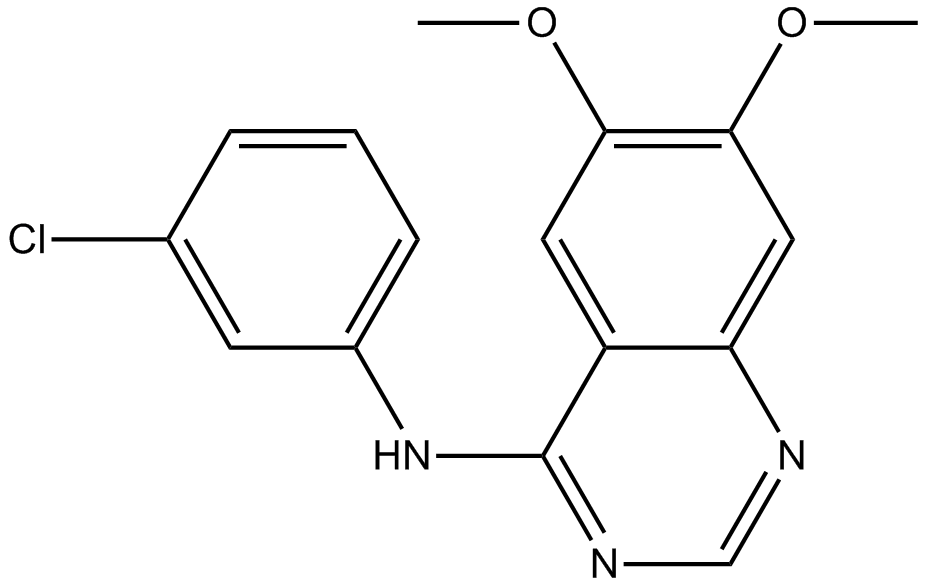
-
GC12864
AG-1557
Tyrphostin AG-1557
inhibitor of epidermal growth factor receptor (EGFR) tyrosine kinase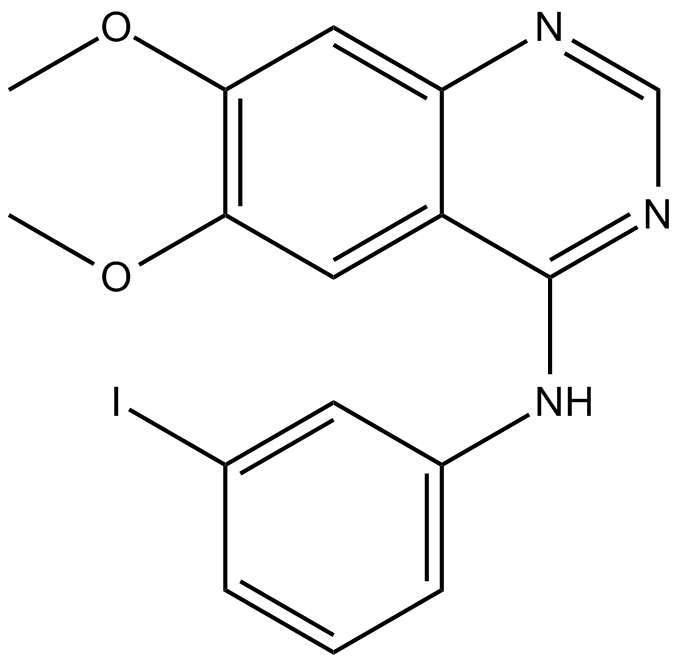
-
GC17647
AG-18
RG50810, RG50858, TX 825, Tyrphostin 23, Tyrphostin AG18
AG-18 (Tyrphostin A23) is an EGFR inhibitor with an IC50 and Kiof 35 and 11 μM, respectively.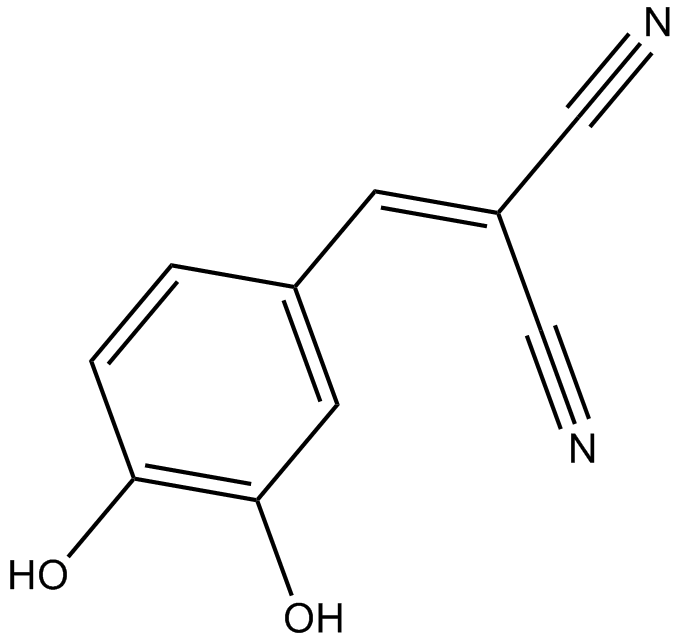
-
GC13854
AG-490 (Tyrphostin B42)
Tyrphostin AG-490
AG-490 (Tyrphostin B42) (Tyrphostin AG-490 (Tyrphostin B42)) is a tyrosine kinase inhibitor that inhibits EGFR, Stat-3 and JAK2/3.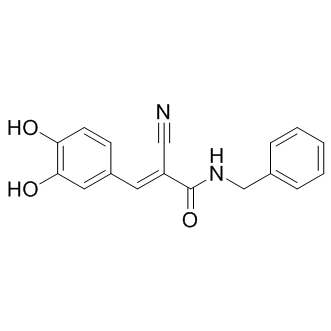
-
GN10705
Alantolactone
(+)-Alantolactone, NSC 333843, NSC 93131
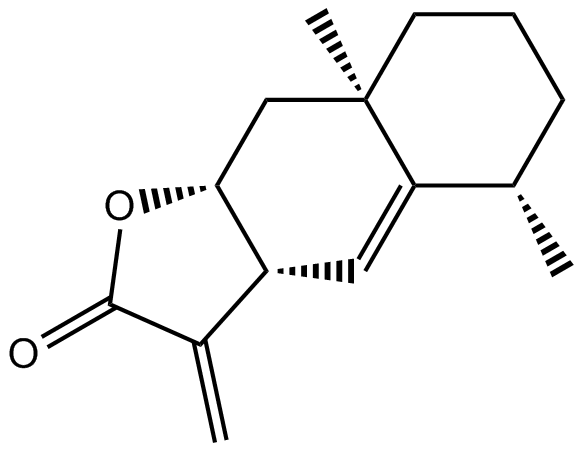
-
GC64398
Almonertinib mesylate
HS-10296 mesylate
Almonertinib (HS-10296) mesylate is an orally available, irreversible, third-generation EGFR tyrosine kinase inhibitor with high selectivity for EGFR-sensitizing and T790M resistance mutations. Almonertinib mesylate shows great inhibitory activity against T790M, T790M/L858R and T790M/Del19 (IC50: 0.37, 0.29 and 0.21 nM, respectively), and is less effective against wild type (3.39 nM). Almonertinib mesylate is used for the research of the non-small cell lung cancer.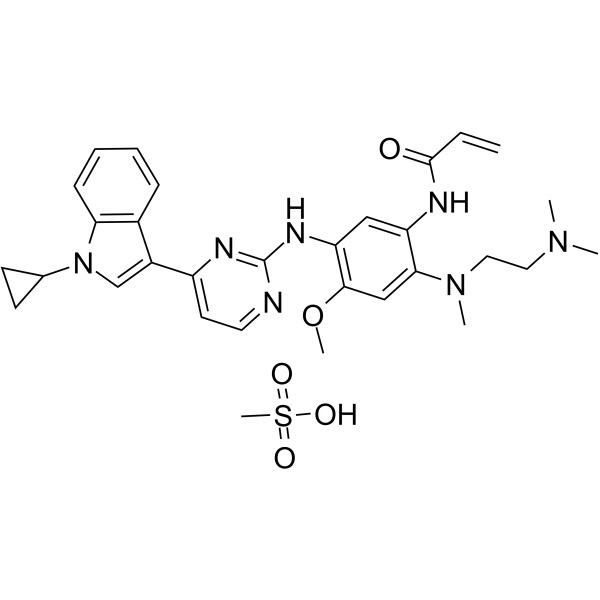
-
GC67749
Amivantamab
JNJ-61186372
Amivantamab (JNJ-61186372) is a human EGFR-MET bispecific antibody with immune anticancer activity

-
GC60585
Angoline
Angoline is a potent and selective IL6/STAT3 signaling pathway inhibitor with an IC50 of 11.56 μM. Angoline inhibits STAT3 phosphorylation and its target gene expression, and inhibits cancer cell proliferation.
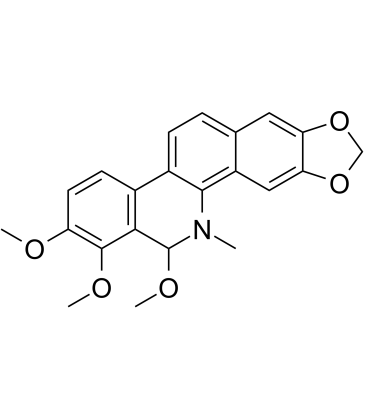
-
GC60586
Angoline hydrochloride
Angoline hydrochloride is a potent and selective IL6/STAT3 signaling pathway inhibitor with an IC50 of 11.56 μM. Angoline hydrochloride inhibits STAT3 phosphorylation and its target gene expression, and inhibits cancer cell proliferation.
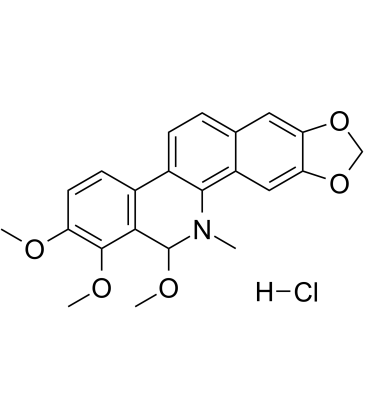
-
GC17283
AP26113
Brigatinib
AP26113 (Brigatinib analog) is a potent and selective active inhibitor of anaplastic lymphoma kinase(ALK), Patent US20140066406 A1.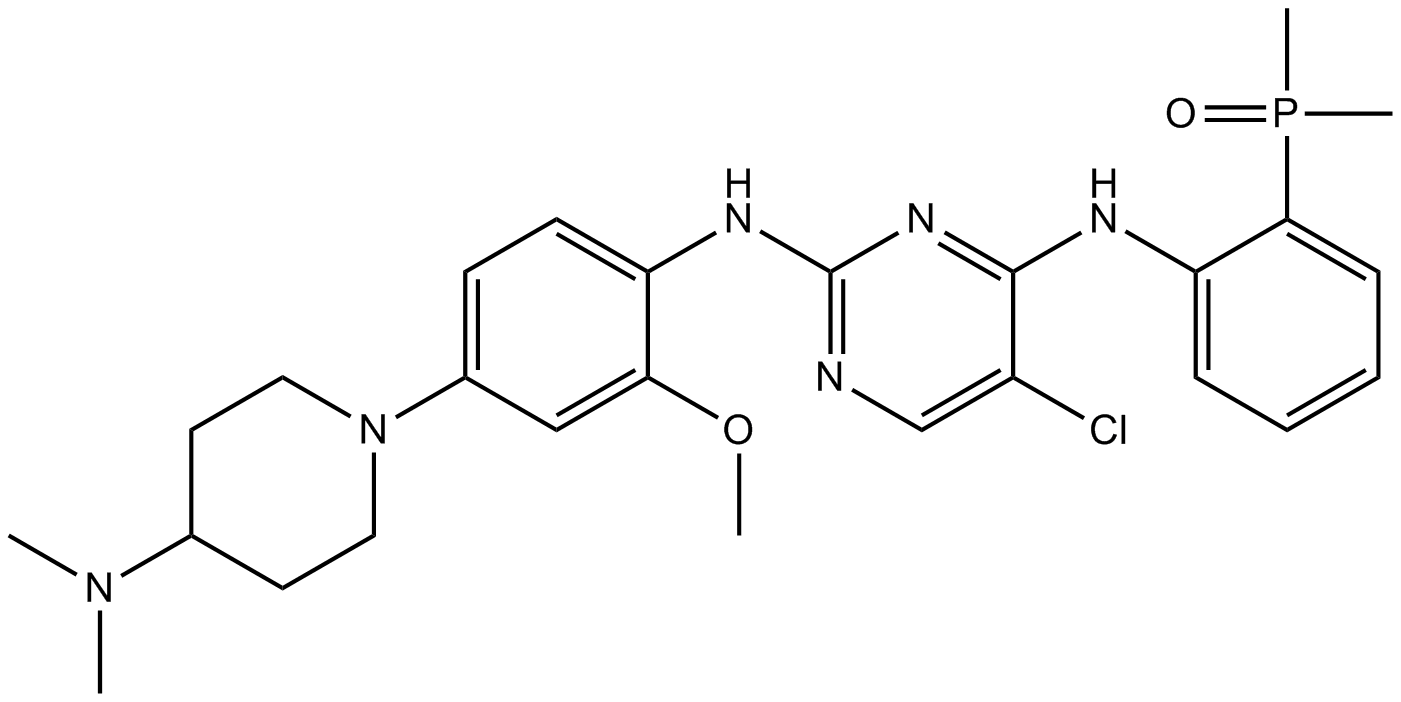
-
GC10439
APTSTAT3-9R
STAT3 inhibitor
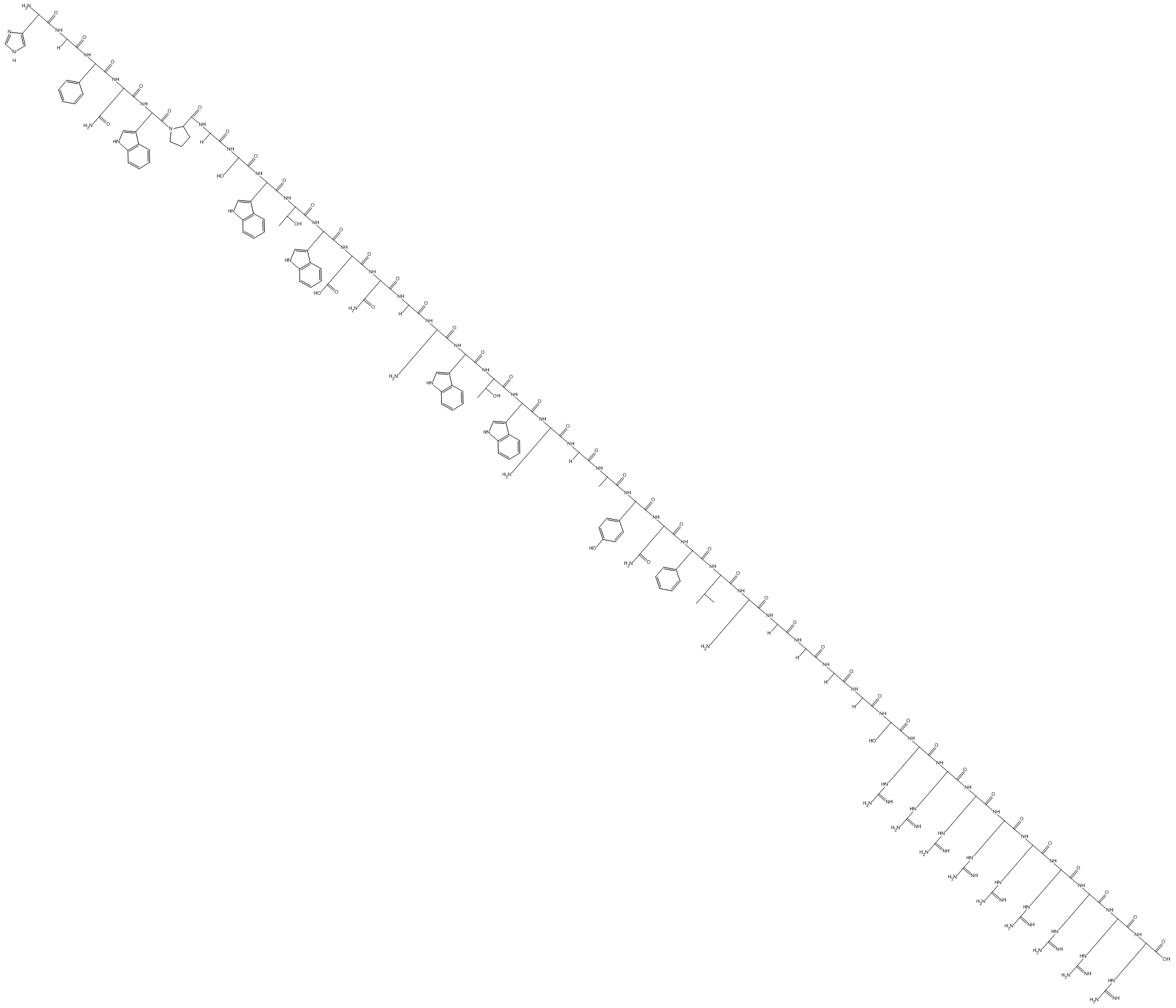
-
GC35395
Arnicolide D
ARD
Arnicolide D is a sesquiterpene lactone isolated from Centipeda minima. Arnicolide D modulates the cell cycle, activates the caspase signaling pathway and inhibits the PI3K/AKT/mTOR and STAT3 signaling pathways. Arnicolide D inhibits Nasopharyngeal carcinoma (NPC) cell viability in a concentration- and time-dependent manner.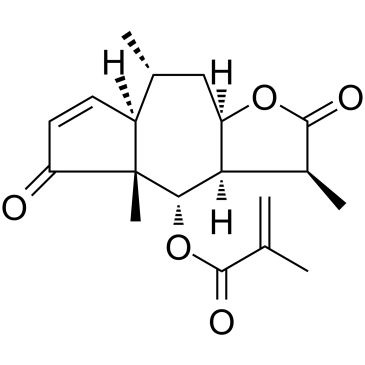
-
GC12478
ARRY-380
ARRY380; ARRY 380
ARRY-380, an inhibitor of EGFR (ErbB1), is extracted from patent WO2015153959A2, compound 249. ARRY-380 is a potent, selective, ATP-competitive, orally active inhibitor of HER2.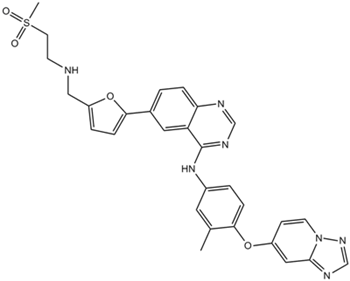
-
GC10889
Artesunate
Artesunic Acid, NSC 712571, WR 256283
Derivative of the natural product artemisinin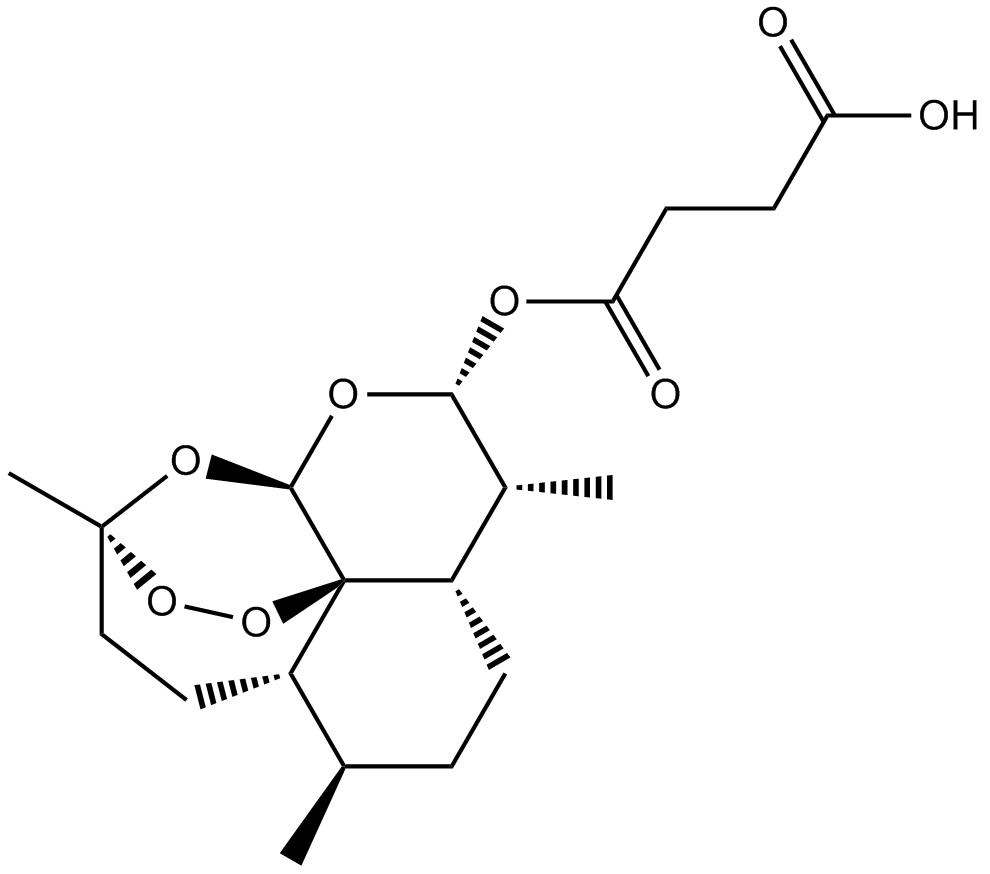
-
GC19039
AS1517499
A potent STAT6 inhibitor
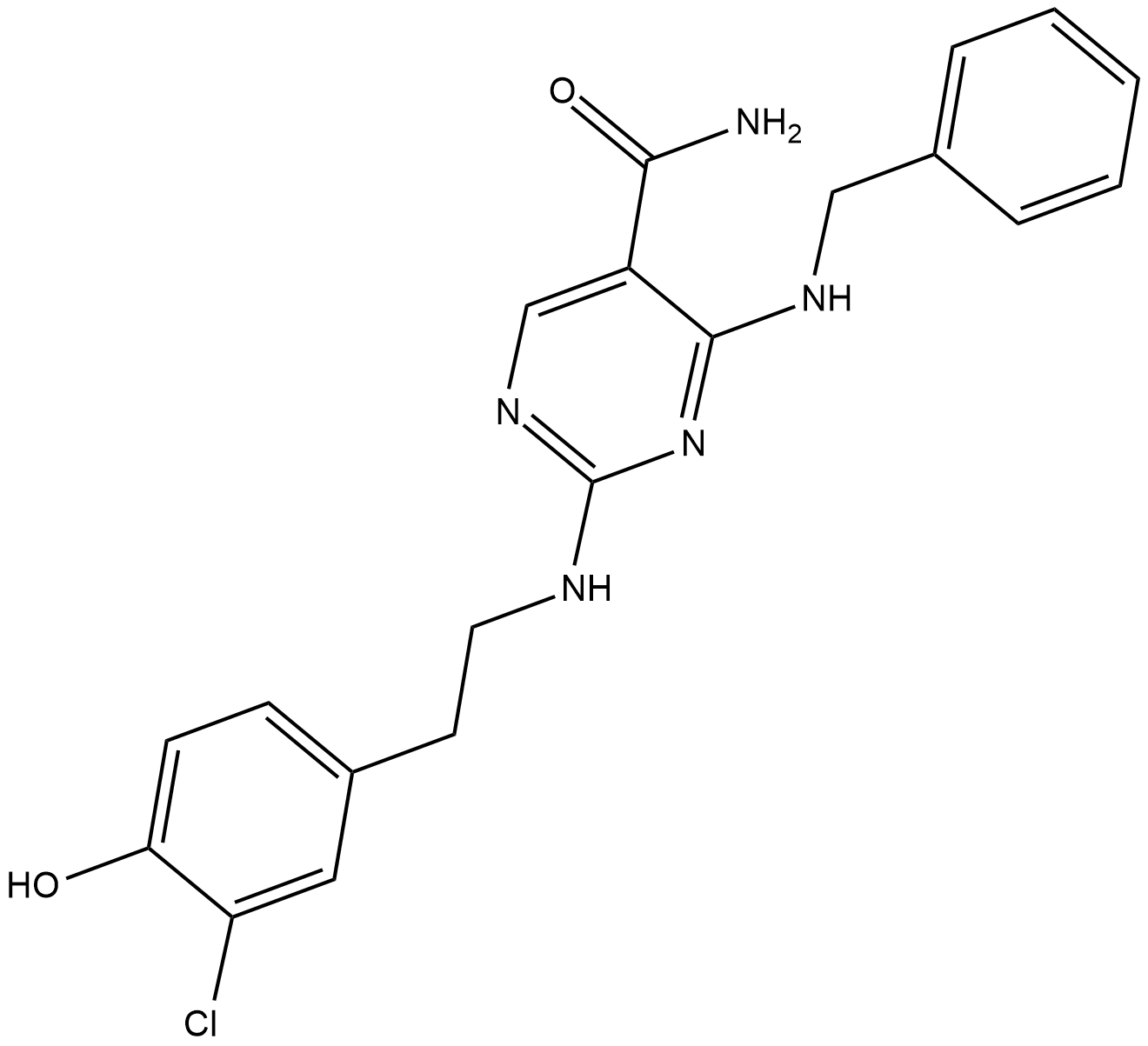
-
GC61574
AS1810722
AS1810722 is an orally active and potent STAT6 inhibitor with an IC50 of 1.9 nM.
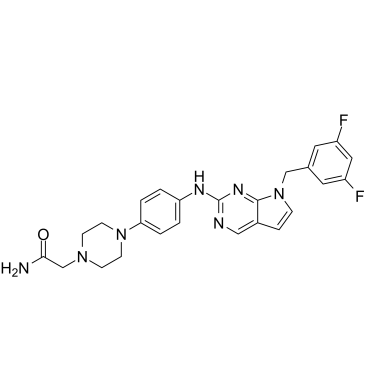
-
GC38736
AS2863619
A dual inhibitor of Cdk8 and Cdk19
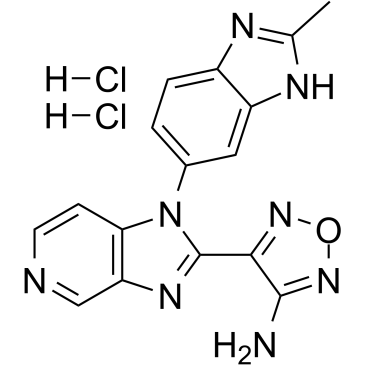
-
GC38737
AS2863619 free base
AS2863619 free base enables conversion of antigen-specific effector/memory T cells into Foxp3+ regulatory T (Treg) cells for the treatment of various immunological diseases.
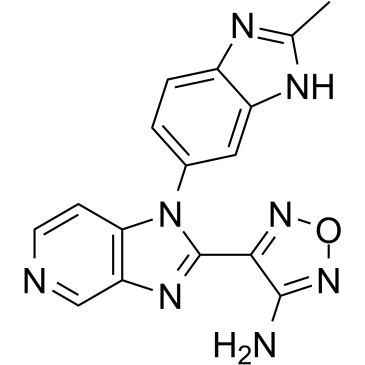
-
GC40715
Ascochlorin
Antibiotic LL-Z1272γ, Ilicicolin D, NSC 287492
Ascochlorin is an isoprenoid antibiotic and antiviral that has diverse effects on mammalian cells.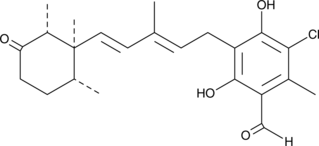
-
GC11691
AST-1306
AST1306; AST 1306
AST-1306 (AST-1306) is an orally active and irreversible EGFR and ErbB2 inhibitor with IC50s of 0.5 and 3 nM, respectively. AST-1306 also inhibits ErbB4 with an IC50 of 0.8 nM. AST-1306 is an anilino-quinazoline compound and has anti-cancer activity.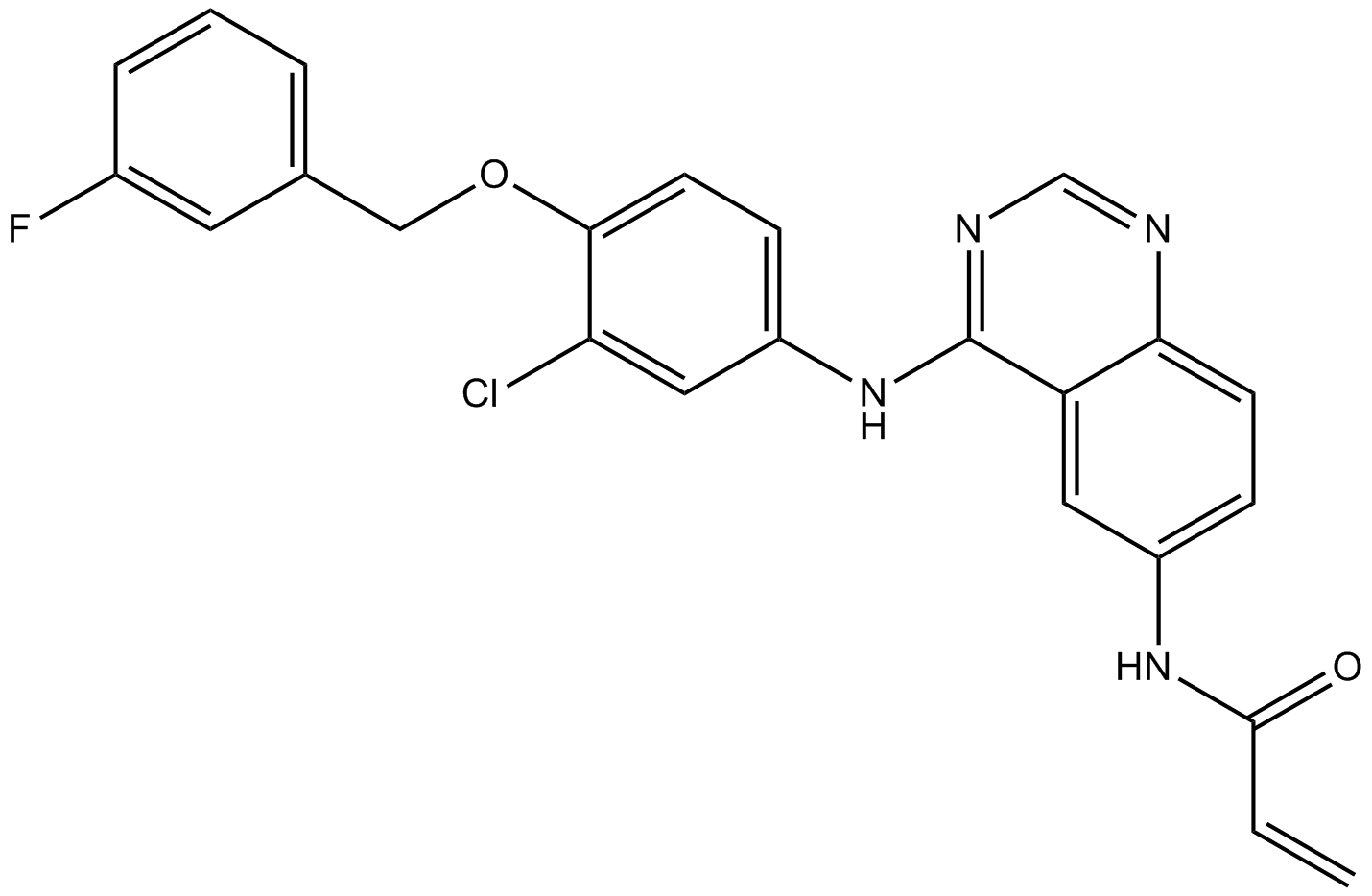
-
GC15669
AST-1306 TsOH
Allitinib
AST-1306 TsOH (AST-1306 (TsOH)) is an orally active and irreversible EGFR and ErbB2 inhibitor with IC50s of 0.5 and 3 nM, respectively. AST-1306 TsOH also inhibits ErbB4 with an IC50 of 0.8 nM. AST-1306 TsOH is an anilino-quinazoline compound and has anti-cancer activity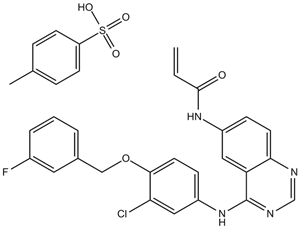
-
GC33096
AST2818 mesylate
AST2818
Alflutinib (Furmonertinib) mesylate is is a potent inhibitor of EGFR. Alflutinib (Furmonertinib) mesylate inhibits EGFR active mutations as well as the T790M acquired resistant mutation. Alflutinib (Furmonertinib) mesylate has the potential for the research of cancer diseases, especially non-small cell lung cancer (NSCLC).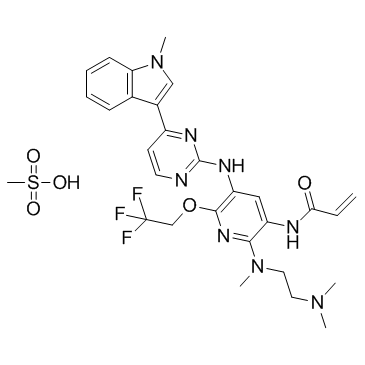
-
GC35413
Astragaloside VI
Astragaloside VI could activate EGFR/ERK signalling pathway to improve wound healing.
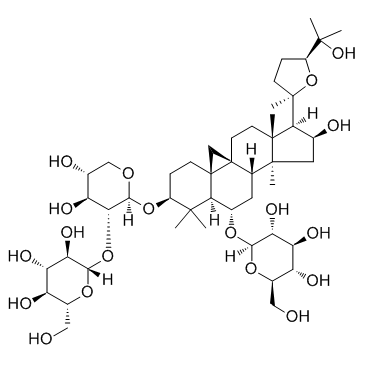
-
GN10627
Atractylenolide I
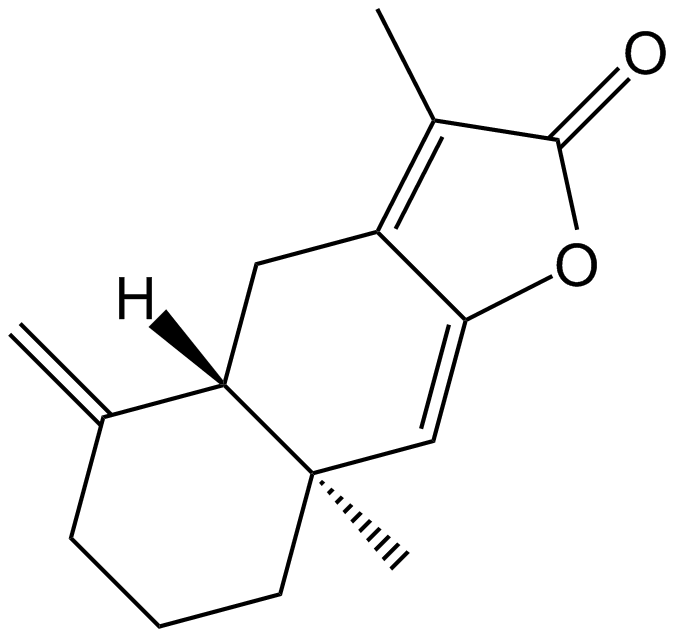
-
GC35435
AV-412
MP-412
A dual inhibitor of EGFR and HER2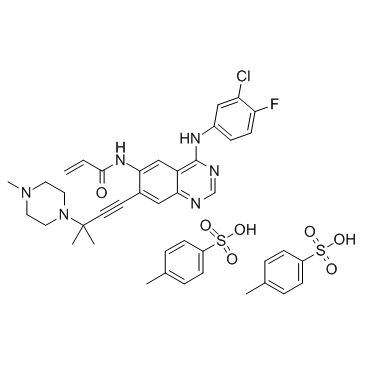
-
GC35436
AV-412 free base
MP-412 free base
AV-412 free base (MP-412 free base) is an EGFR inhibitor with IC50s of 0.75, 0.5, 0.79, 2.3, 19 nM for EGFR, EGFRL858R, EGFRT790M, EGFRL858R/T790M and ErbB2, respectively.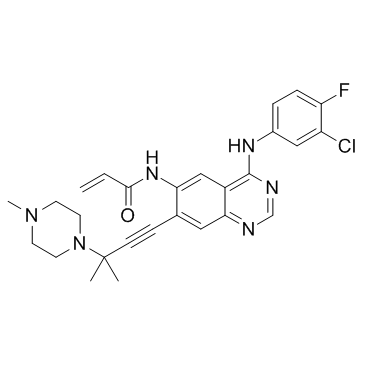
-
GC19044
Avitinib maleate
A pyrrolopyrimidine-based irreversible EGFR inhibitor
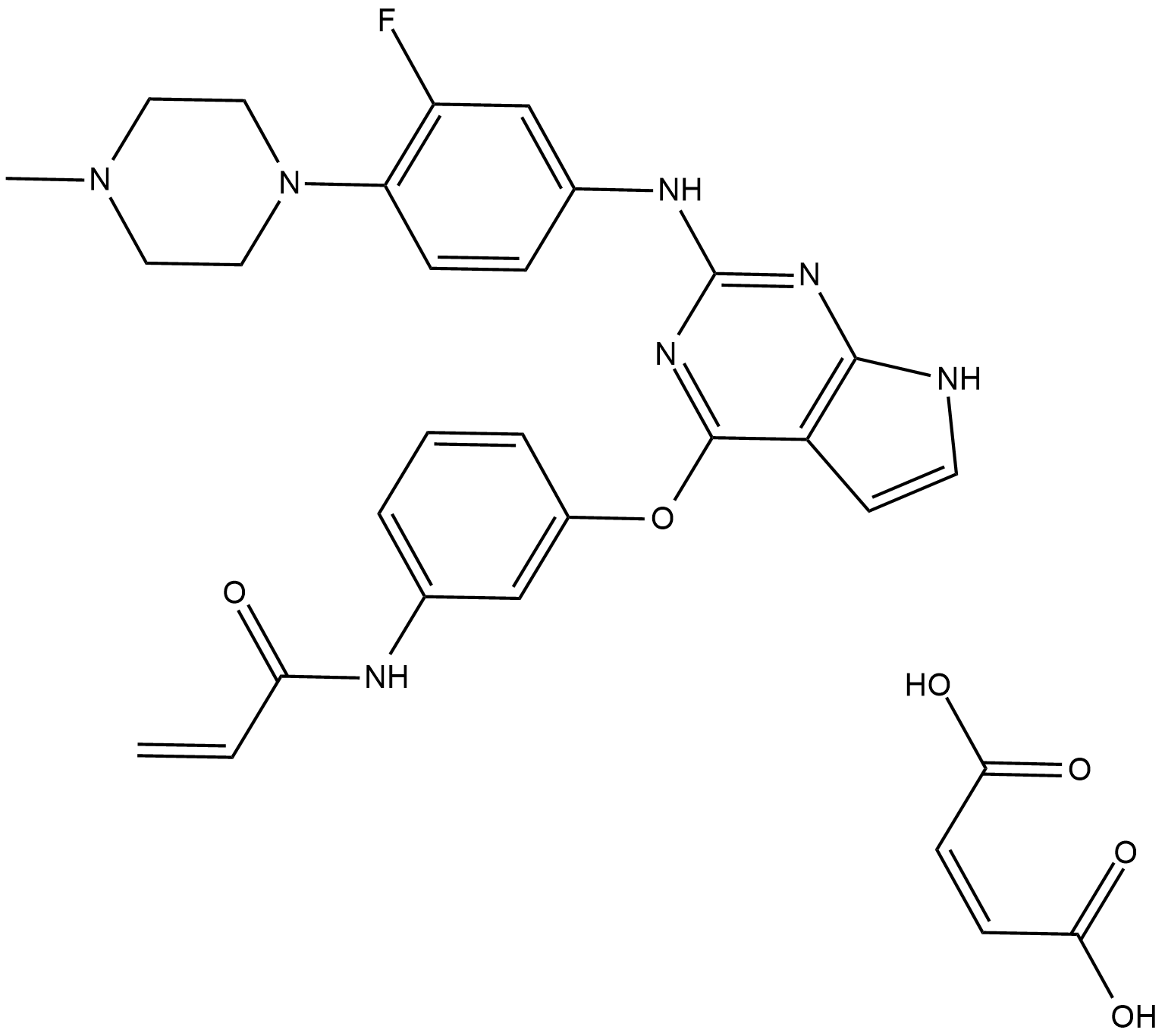
-
GC12955
AZ5104
EGFR inhibitor
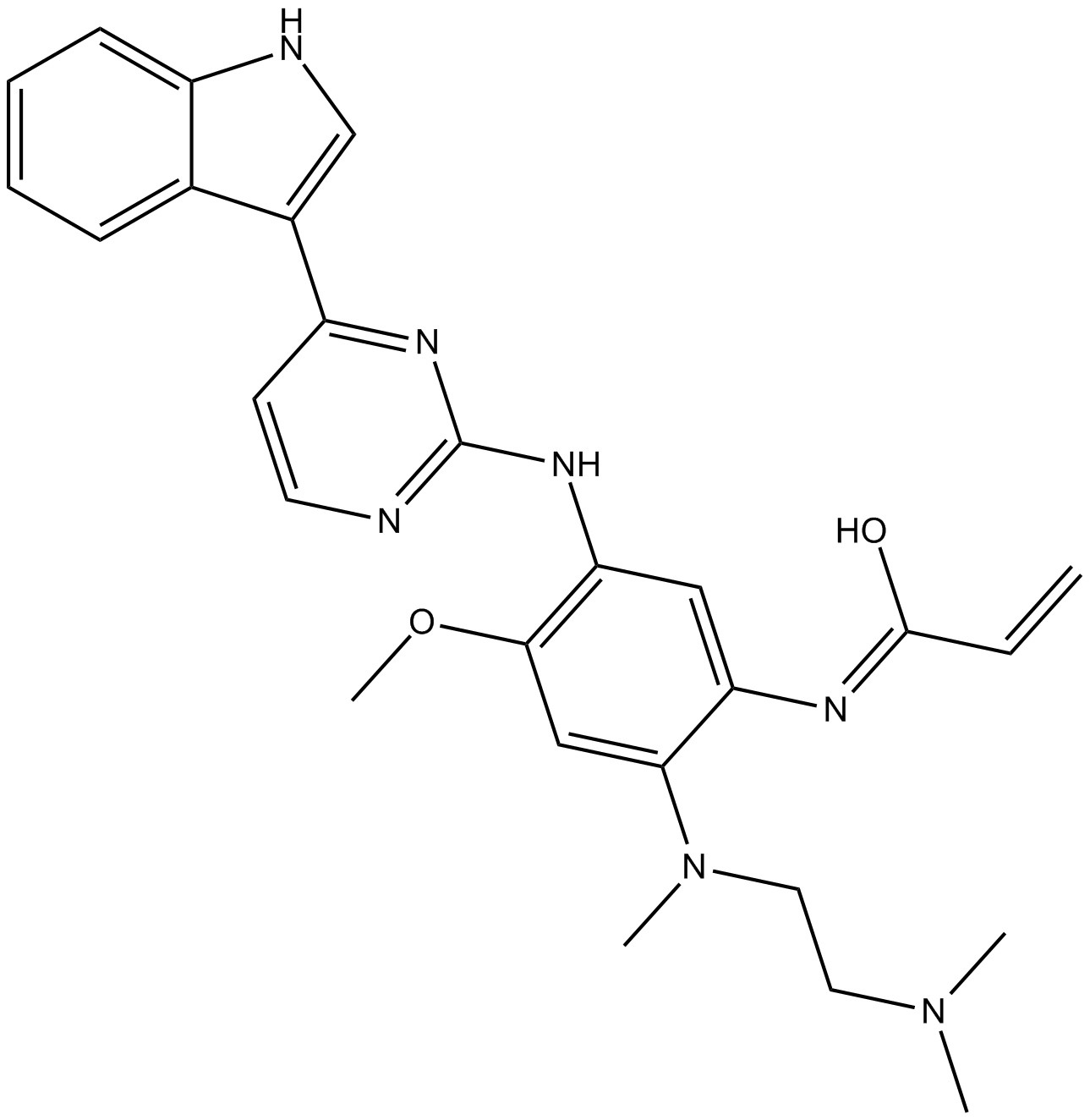
-
GC16308
AZD-9291
osimertinib
AZD-9291 (AZD9291) is a covalent, orally active, irreversible, and mutant-selective EGFR inhibitor with an apparent IC50 of 12 nM against L858R and 1 nM against L858R/T790M, respectively. AZD-9291 overcomes T790M-mediated resistance to EGFR inhibitors in lung cancer.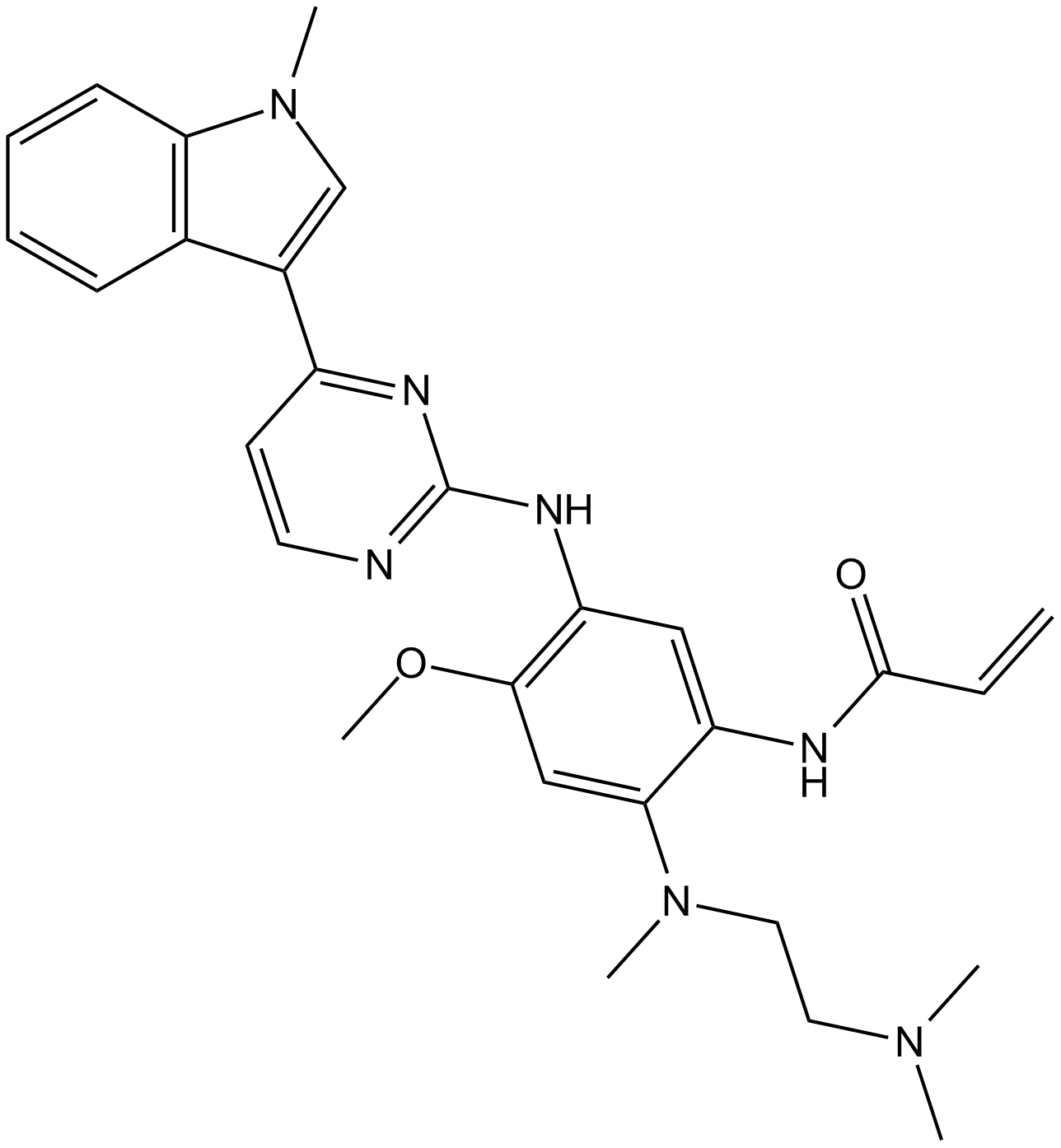
-
GC16698
AZD-9291 mesylate
AZD-9291 mesylate (AZD9291 mesylate) is a covalent, orally active, irreversible, and mutant-selective EGFR inhibitor with an apparent IC50 of 12 nM against L858R and 1 nM against L858R/T790M. Osimertinib overcomes T790M-mediated resistance to EGFR inhibitors in lung cancer.
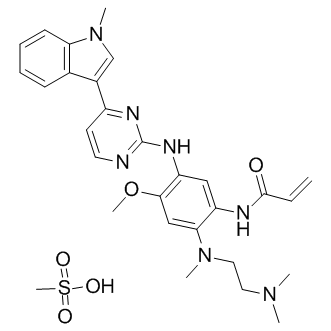
-
GC35447
AZD1208 hydrochloride
AZD1208 hydrochloride is an orally bioavailable, highly selective PIM kinases inhibitor.
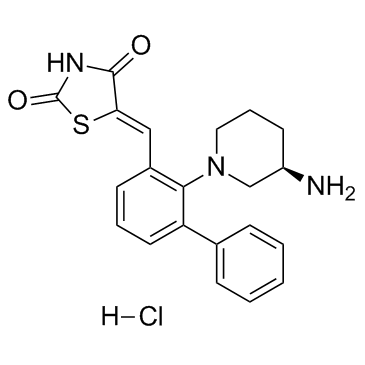
-
GC13143
AZD3759
AZD3759
AZD3759 (AZD3759) is a potent, orally active, central nervous system-penetrant, EGFR inhibitor. At Km ATP concentrations, the IC50s are 0.3, 0.2, and 0.2 nM for EGFRwt, EGFRL858R, and EGFRexon 19Del, respectively.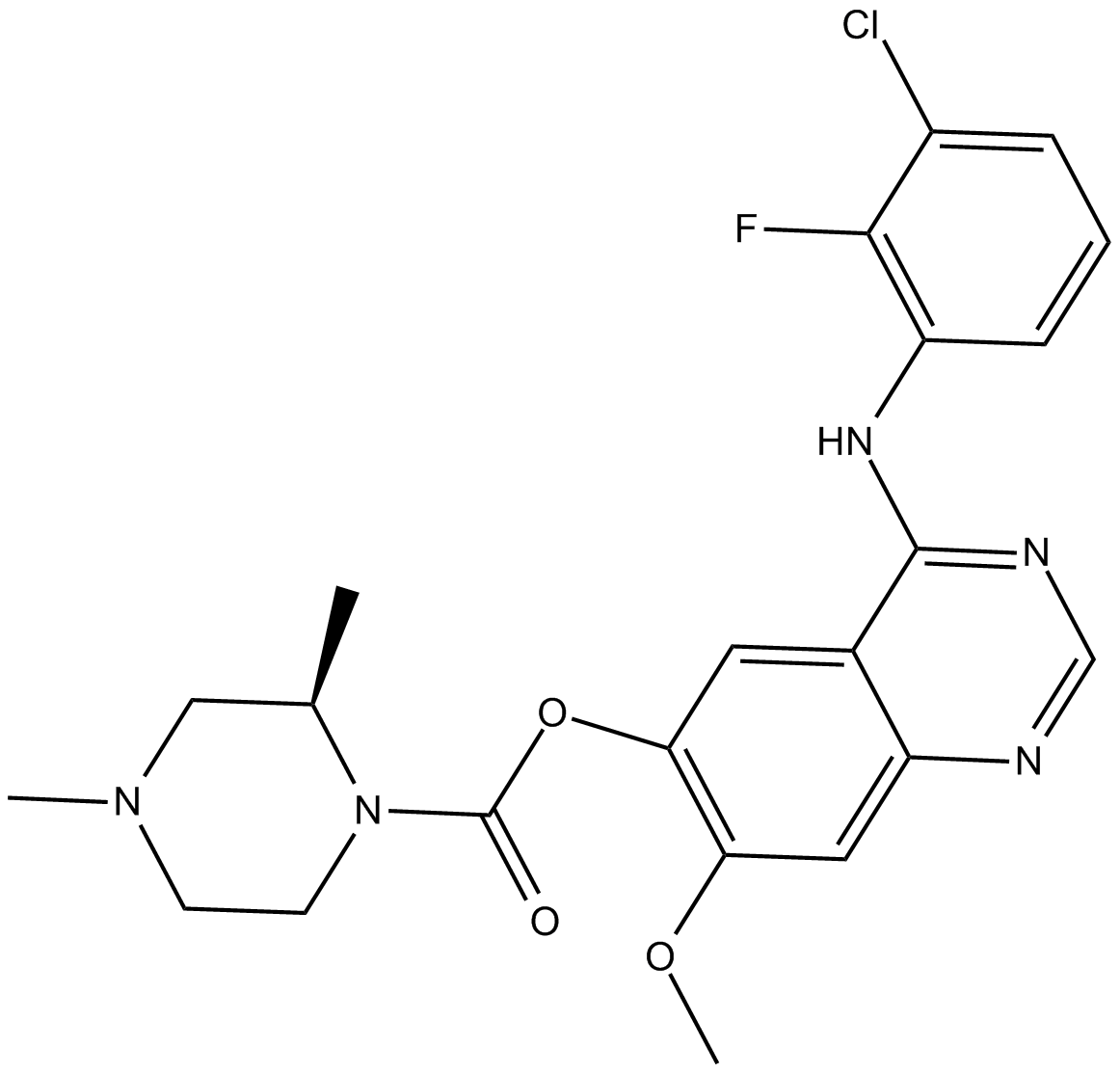
-
GC13761
AZD8931 (Sapitinib)
Sapitinib
AZD8931 (Sapitinib) (AZD-8931) is a reversible, ATP competitive EGFR inhibitor of with IC50s of 4, 3 and 4 nM for EGFR, ErbB2 and ErbB3 in cells, respectively.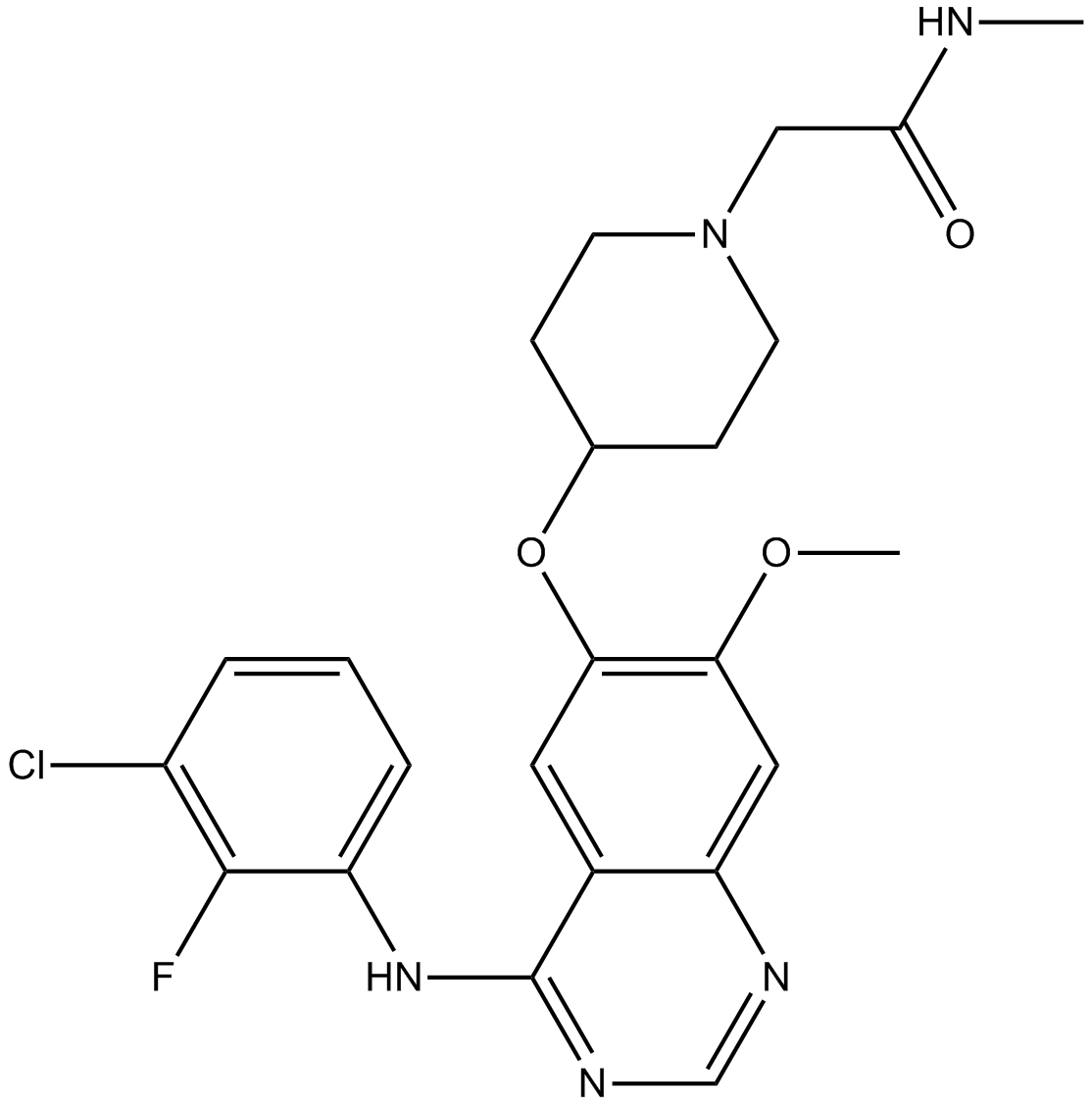
-
GC18126
Balsalazide
anti-inflammatory drug
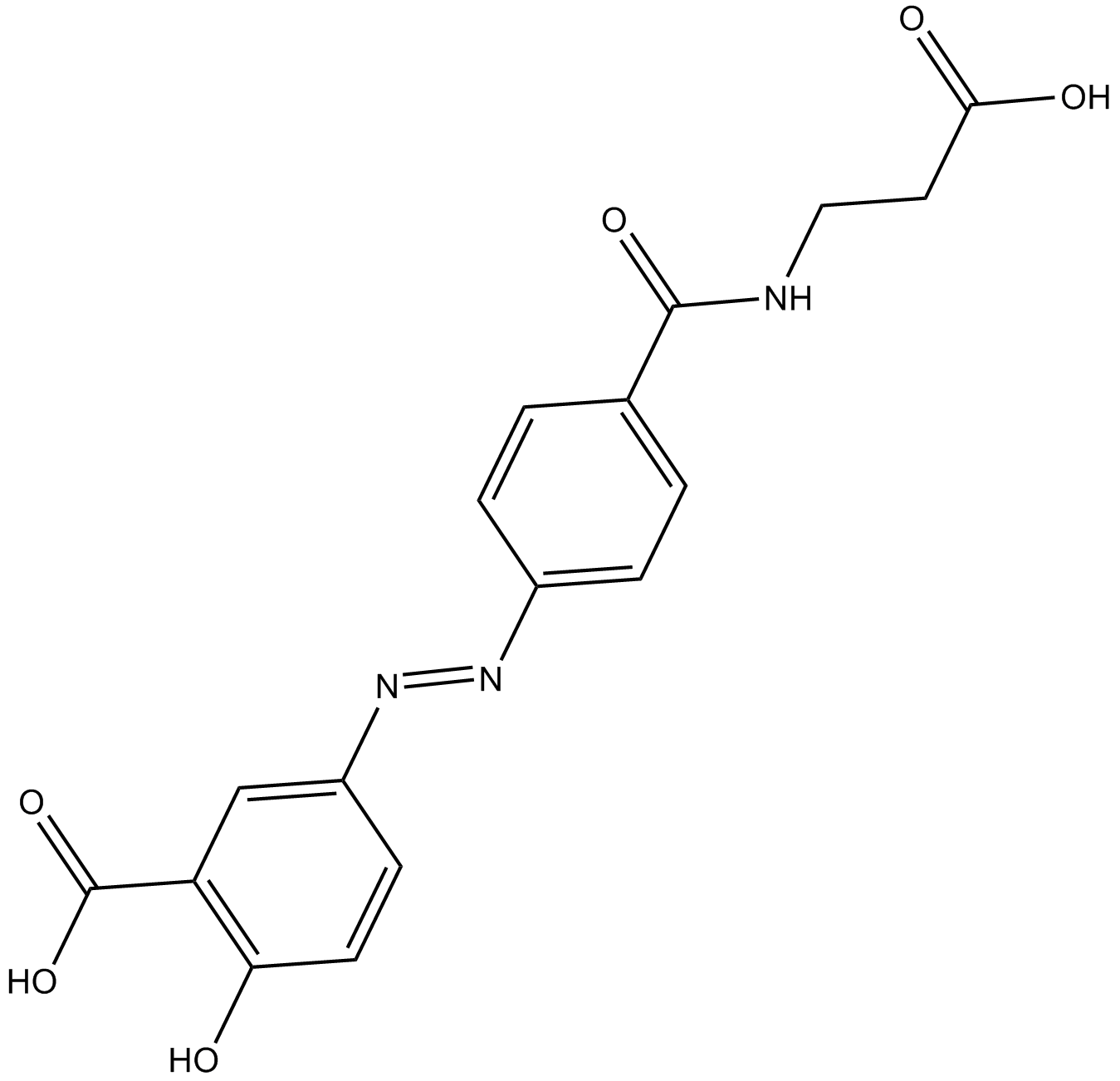
-
GC35466
Balsalazide sodium hydrate
Balsalazide sodium hydrate could suppress colitis-associated carcinogenesis through modulation of IL-6/STAT3 pathway.
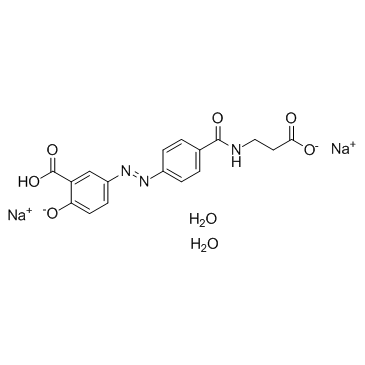
-
GC64302
BAY 2476568
BAY 2476568 is a potent and selective EGFR inhibitor, with IC50s of < 0.2 nM for wild-type EGFR and several mutations (EGFRR ex20insSVD, EGFRR ex20insASV, EGFRR ex20insNPG).
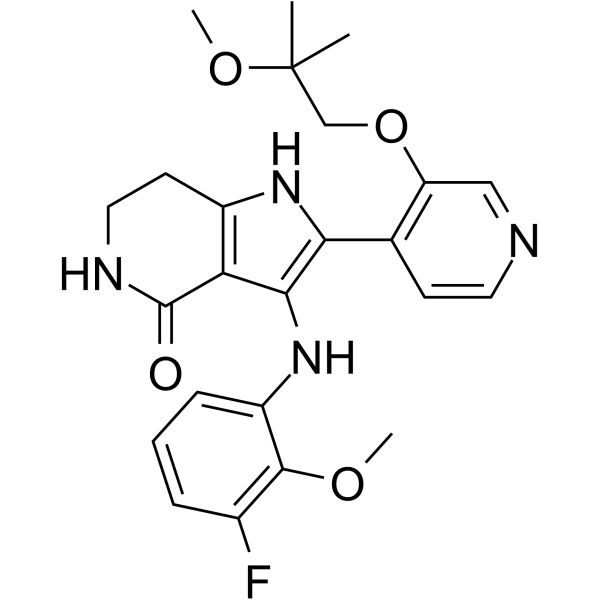
-
GC64017
Befotertinib
D-0316
Befotertinib (D-0316) is the third-generation EGFR tyrosine kinase inhibitor. Befotertinib can be used for the research of EGFR T790M-positive non-small cell lung cancer (NSCLC).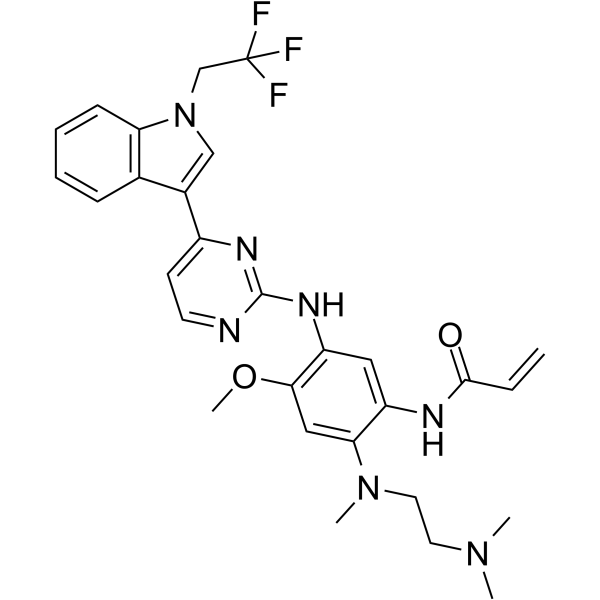
-
GC33172
BGB-102 (JNJ-26483327)
BGB-102 (JNJ-26483327) is a potent multi-kinase inhibitor against EGFR, HER2, and HER4 with IC50s of 9.6 nM, 18 nM and 40.3 nM, respectively.
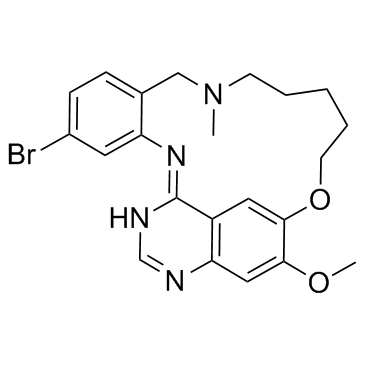
-
GC19066
BGB-283
BGB-283 is a novel and potent Raf Kinase and EGFR inhibitor with IC50 values of 23 and 29 nM for recombinant BRafV600E and EGFR, respectively.
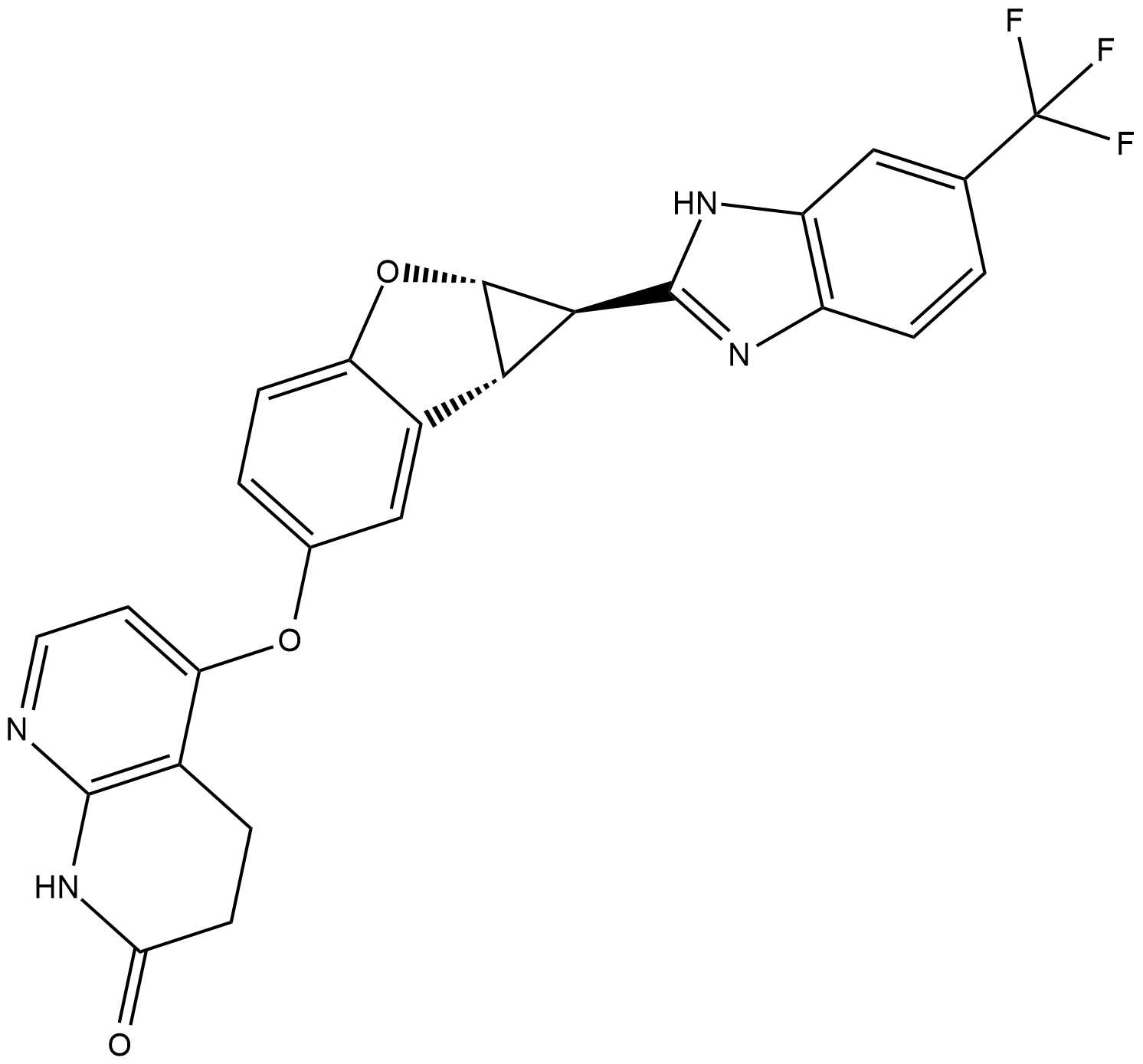
-
GC68759
BI-1622
BI-1622 is an orally effective and highly selective HER2 (ERBB2) inhibitor with an IC50 of 7 nM. BI-1622 has a selectivity for EGFR greater than 25-fold. In transplant mouse models of H2170 and PC9 cells, BI-1622 showed high in vivo anti-tumor effects and has good activity molecular metabolism and pharmacokinetic properties.

-
GC38402
BI-4020
A fourth-generation and non-covalent EGFR tyrosine kinase inhibitor
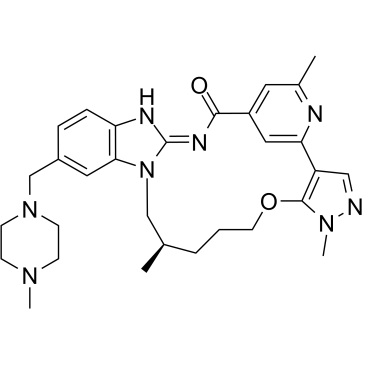
-
GC68762
BI-4142
BI-4142 is an effective, highly selective, orally active HER2 inhibitor with an IC50 value of 5 nM.

-
GC63910
BLU-945
BLU-945 is a potent, highly selective, reversible and orally active epidermal growth factor receptor (EGFR) tyrosine kinase inhibitor (TKIs). BLU-945 can effectively inhibit EGFR with L858R and/or exon 19 deletion mutation, T790M mutation and C797S mutation. BLU-945 can be used for the research of lung cancer including non-small cell lung cancer (NSCLC).
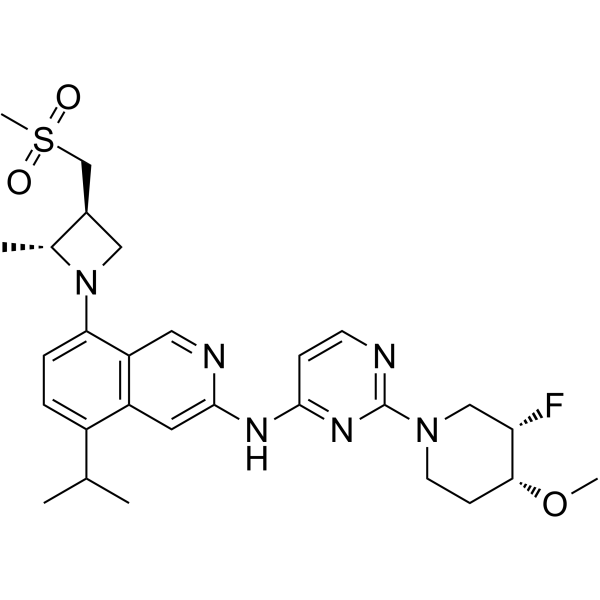
-
GC32028
BMS-066
BMS-066 is an IKKβ/Tyk2 pseudokinase inhibitor, with IC50s of 9 nM and 72 nM, respectively.
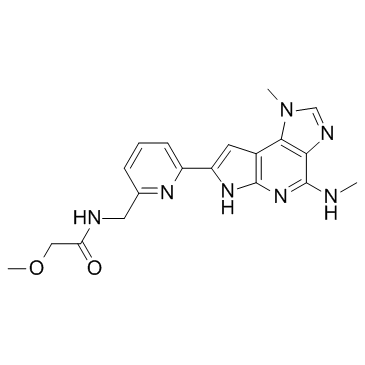
-
GC34063
BP-1-102
A STAT3 inhibitor
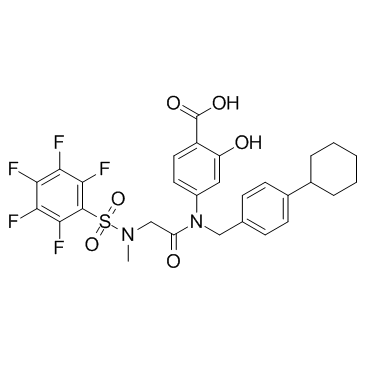
-
GC42974
Brassinin
BSN
Brassinin (BSN) is a phytoalexin isolated from B.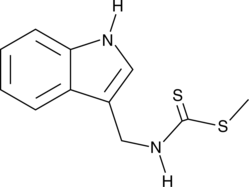
-
GC25168
Brepocitinib (PF-06700841)
PF-841
Brepocitinib (PF-06700841, PF-841) is a potent inhibitor of Tyk2 and Jak1 with IC50s of 23 nM, 17 nM, 77 nM for Tyk2, Jak1 and Jak2 respectively. It has appropriate in-family selectivity against JAK2 and JAK3.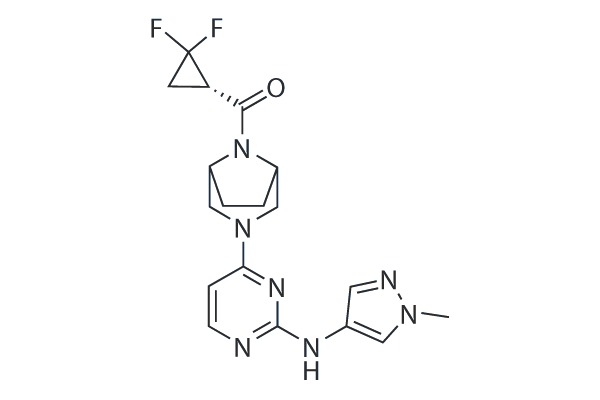
-
GC35554
Brevilin A
6-O-Angeloylprenolin, Brevelin A
A sesquiterpene lactone with anticancer activity
-
GC10944
Butein
2’,3,4,4’tetrahydroxy Chalcone
Protein kinase inhibitor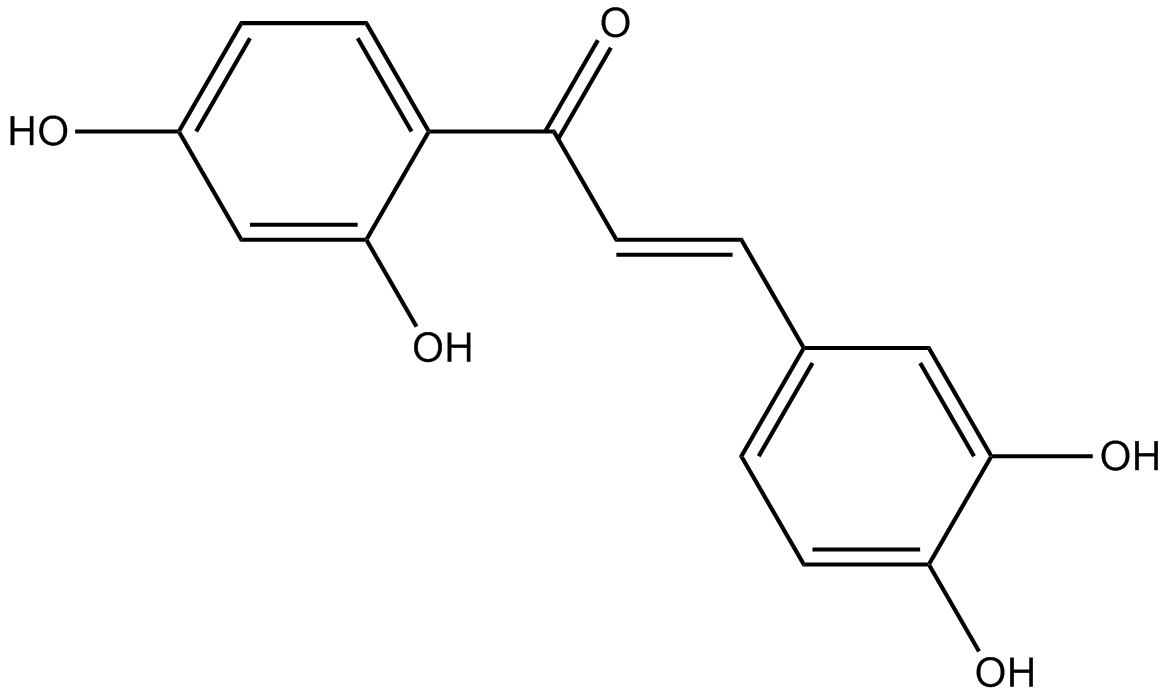
-
GC68819
Butyzamide
Butyzamide is an orally effective Mpl activator, where Mpl is a receptor for thrombopoietin (TPO) involved in platelet production. Butyzamide increases the phosphorylation levels of JAK2, STAT3, STAT5 and MAPK. In mouse xenograft experiments, Butyzamide increases human platelet levels.

-
GC34076
C188-9
TTI-101
A STAT3 inhibitor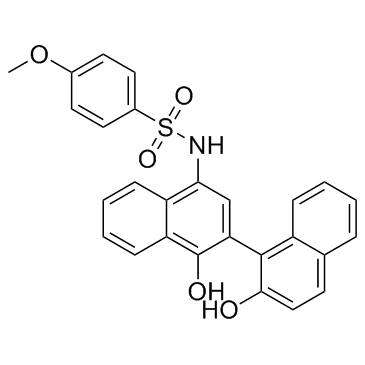
-
GC12910
Canertinib (CI-1033)
Canertinib (CI-1033) (CI-1033;PD-183805) is a potent and irreversible EGFR inhibitor; inhibits cellular EGFR and ErbB2 autophosphorylation with IC50s of 7.4 and 9 nM.
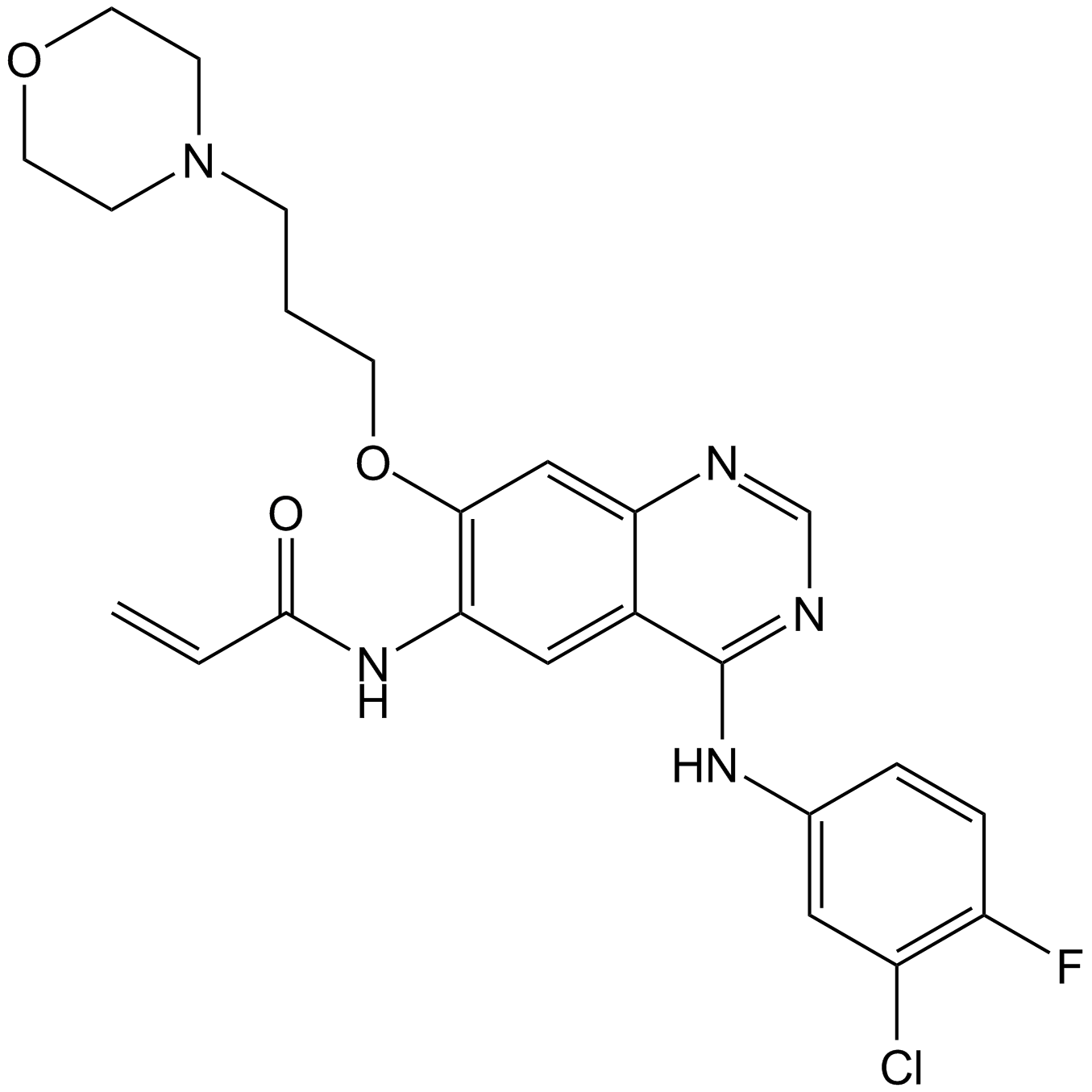
-
GC47061
CAY10763
A dual inhibitor of IDO1 and STAT3 activation
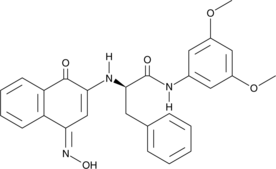
-
GC49139
CAY10784
A STAT3 inhibitor
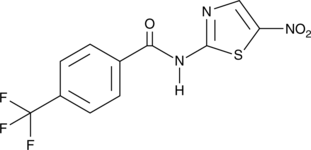
-
GC35651
Cenisertib
AS-703569; R-763
Cenisertib (AS-703569) is an ATP-competitive multi-kinase inhibitor that blocks the activity of Aurora-kinase-A/B, ABL1, AKT, STAT5 and FLT3. Cenisertib induces major growth-inhibitory effects by blocking the activity of several different molecular targets in neoplastic mast cells (MC). Cenisertib inhibits tumor growth in xenograft models of pancreatic, breast, colon, ovarian, and lung tumors and leukemia.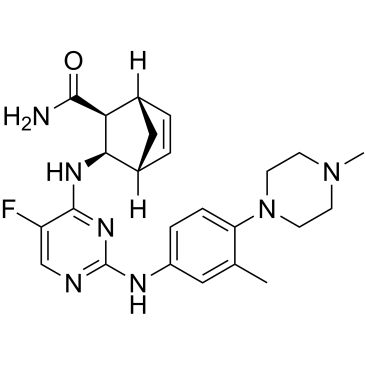
-
GC11209
Cerdulatinib (PRT062070)
PRT062070, PRT2070
Cerdulatinib (PRT062070) (PRT062070) is a selective Tyk2 inhibitor with an IC50 of 0.5 nM. Cerdulatinib (PRT062070) (PRT062070) also is a dual JAK and SYK inhibitor with IC50s of 12, 6, 8 and 32 for JAK1, 2, 3 and SYK, respectively.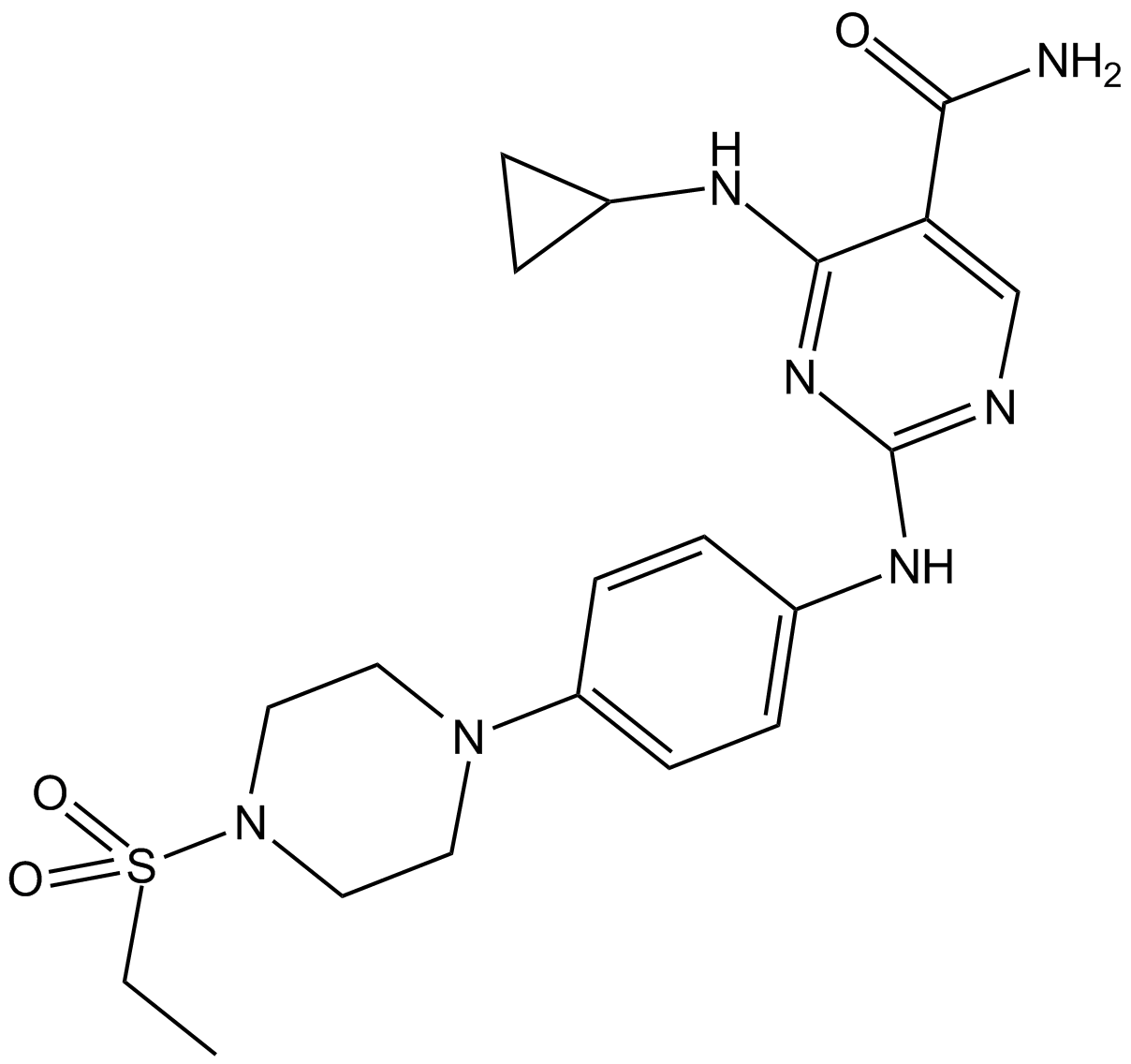
-
GC34217
Cetuximab (C225)
C225
Cetuximab (C225) (C225) is a human IgG1 monoclonal antibody that inhibits epidermal growth factor receptor (EGFR), with a Kd of 0.201 nM for EGFR by SPR. Cetuximab (C225) has potent antitumor activity.
-
GC15950
CGP 52411
CGP 52411, 4,5-Dianilinophthalimide
EGFR inhibitor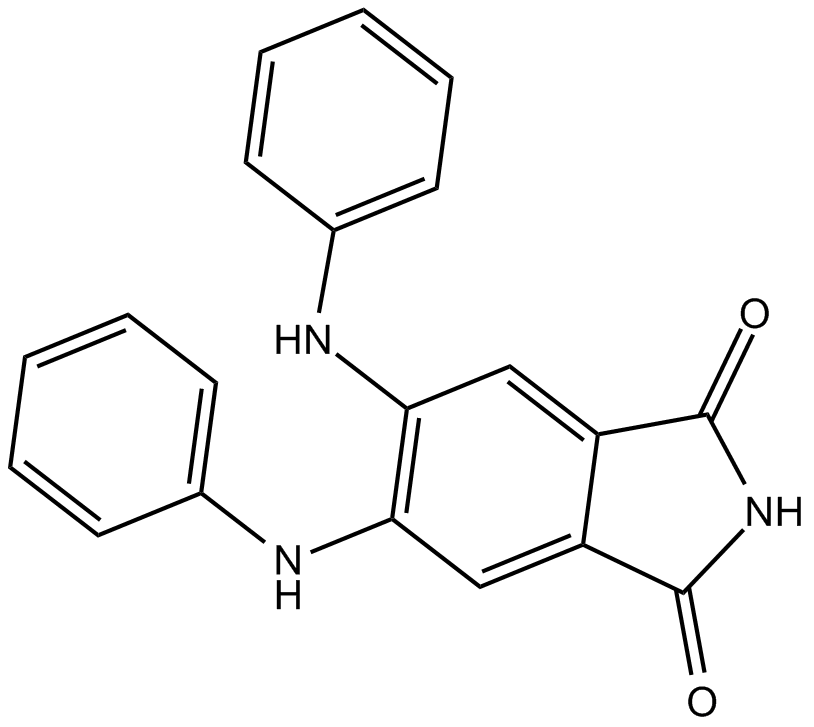
-
GC25219
CH7233163
CH7233163 is a non-covalent ATP competitive inhibitor of EGFR-tyrosine kinase with antitumor activities against tumor with EGFR-Del19/T790M/C797S.
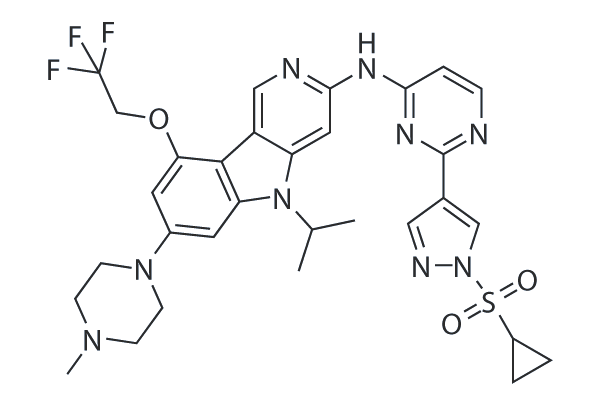
-
GC35684
CHMFL-EGFR-202
CHMFL-EGFR-202 is a potent, irreversible inhibitor of epidermal growth factor receptor (EGFR) mutant kinase, with IC50s of 5.3 nM and 8.3 nM for drug-resistant mutant EGFR T790M and WT EGFR kinases, respectively. CHMFL-EGFR-202 exhibits ?10-fold selectivity for EGFR L858R/T790M against the EGFR wild-type in cells. CHMFL-EGFR-202 adopts a covalent “DFG-in-C-helix-out” inactive binding conformation with EGFR, with strong antiproliferative effects against EGFR mutant-driven nonsmall-cell lung cancer (NSCLC) cell lines.
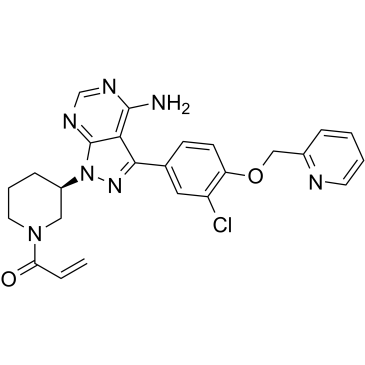
-
GC11652
CHZ868
Type II JAK2 inhibitor
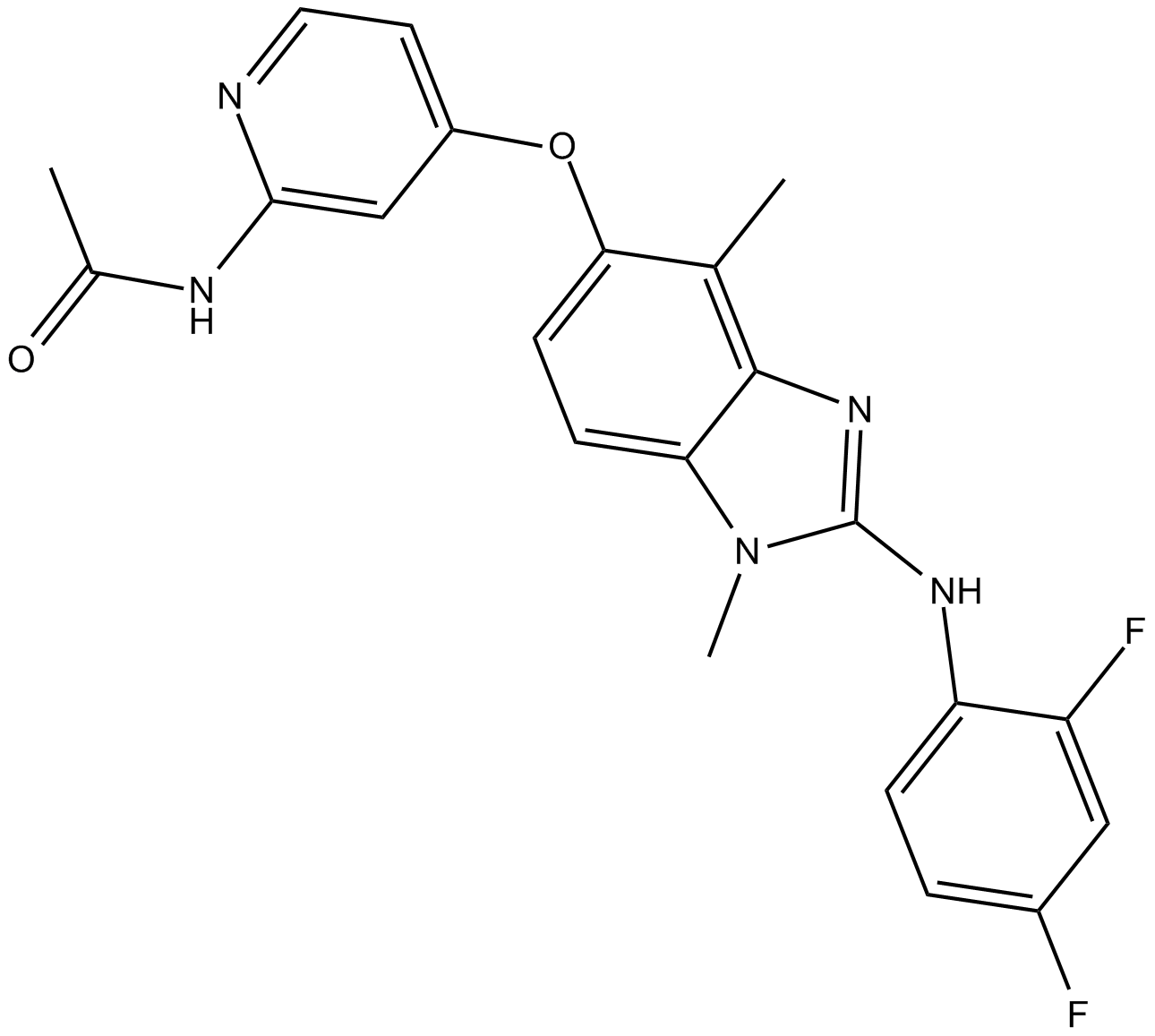
-
GC17790
CL-387785 (EKI-785)
EKB-785, EKI-785, WAY-EKI-785
CL-387785 (EKI-785)(EKI785; WAY-EKI 785) is an irreversible inhibitor of EGFR with IC50 of 370 pM.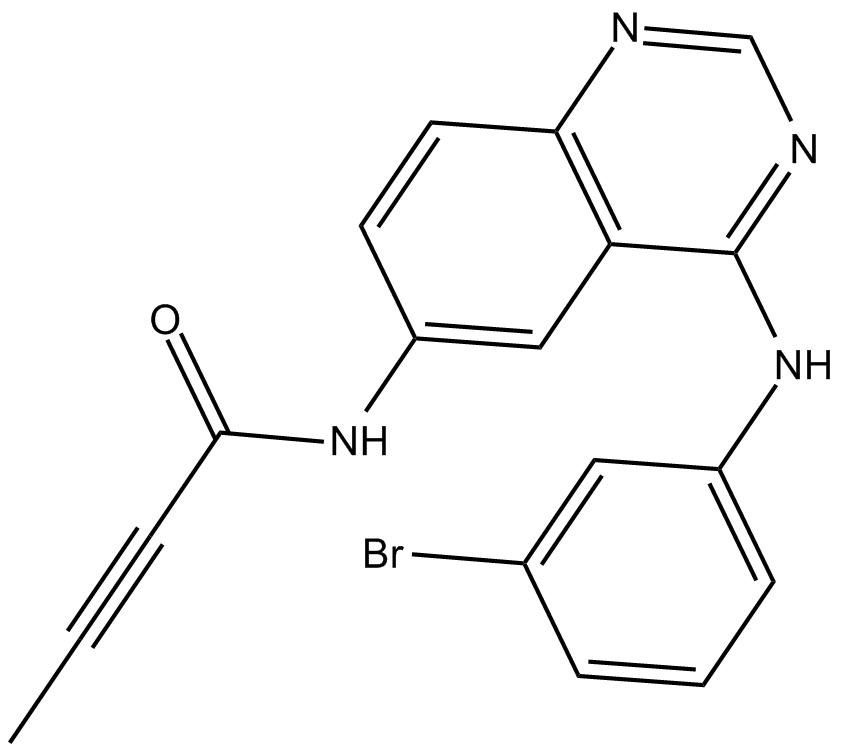
-
GC34238
CMD178
CMD178 is a lead peptide that consistently reduced the expression of Foxp3 and STAT5 induced by IL-2/s IL-2Rα signaling and inhibits Treg cell development.
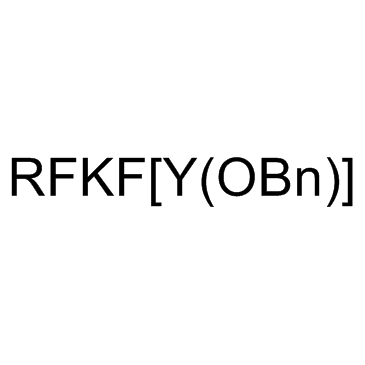
-
GC35715
CMD178 TFA
CMD178 TFA is a lead peptide that consistently reduced the expression of Foxp3 and STAT5 induced by IL-2/s IL-2Rα signaling and inhibits Treg cell development.
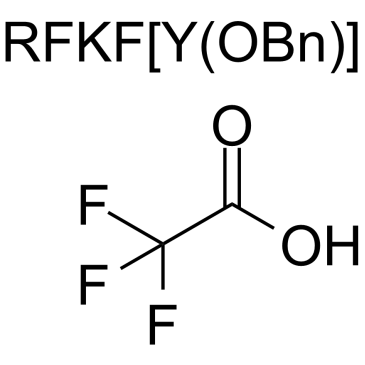
-
GC11264
CNX-2006
mutant-EGFR inhibitor, selective and irreversible
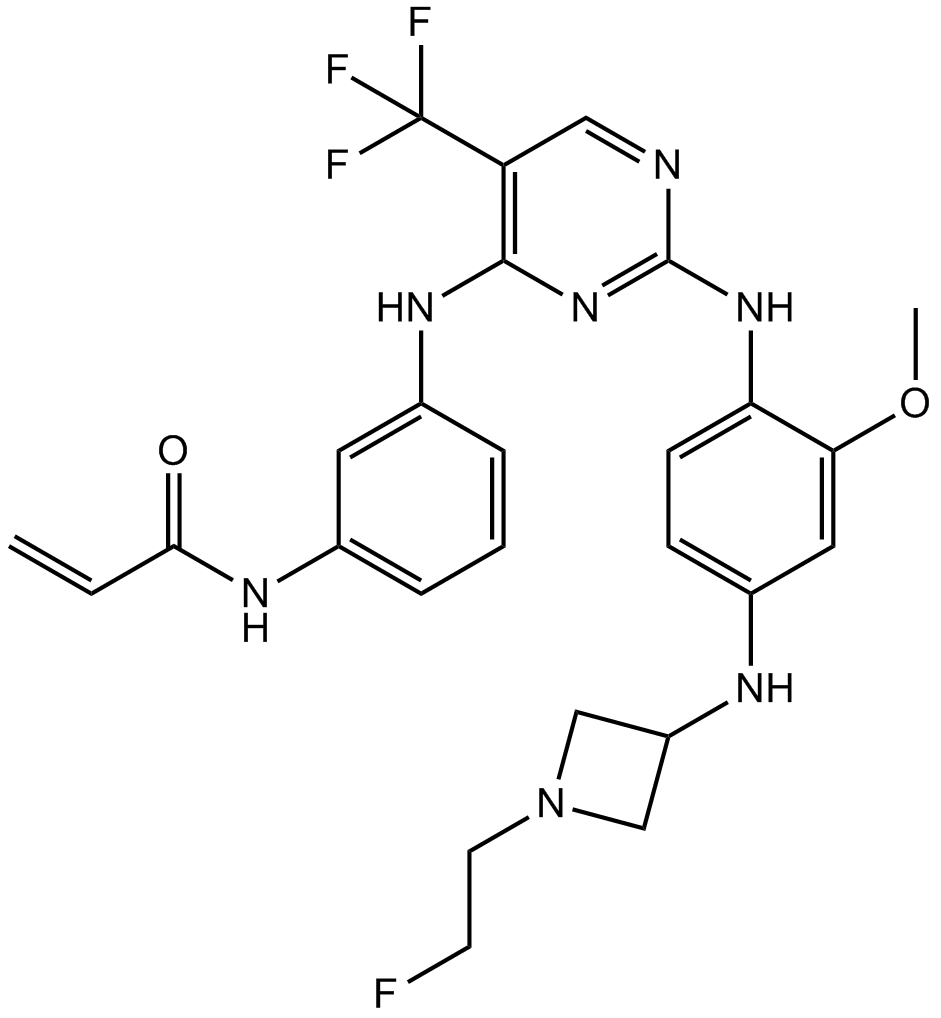
-
GC14854
Colivelin
Colivelin (CLN) is A brain-permeable neuroprotective peptide that has effective long-term effects on Aβ deposition, neuronal apoptosis and synaptic plasticity defects in neurodegenerative diseases.
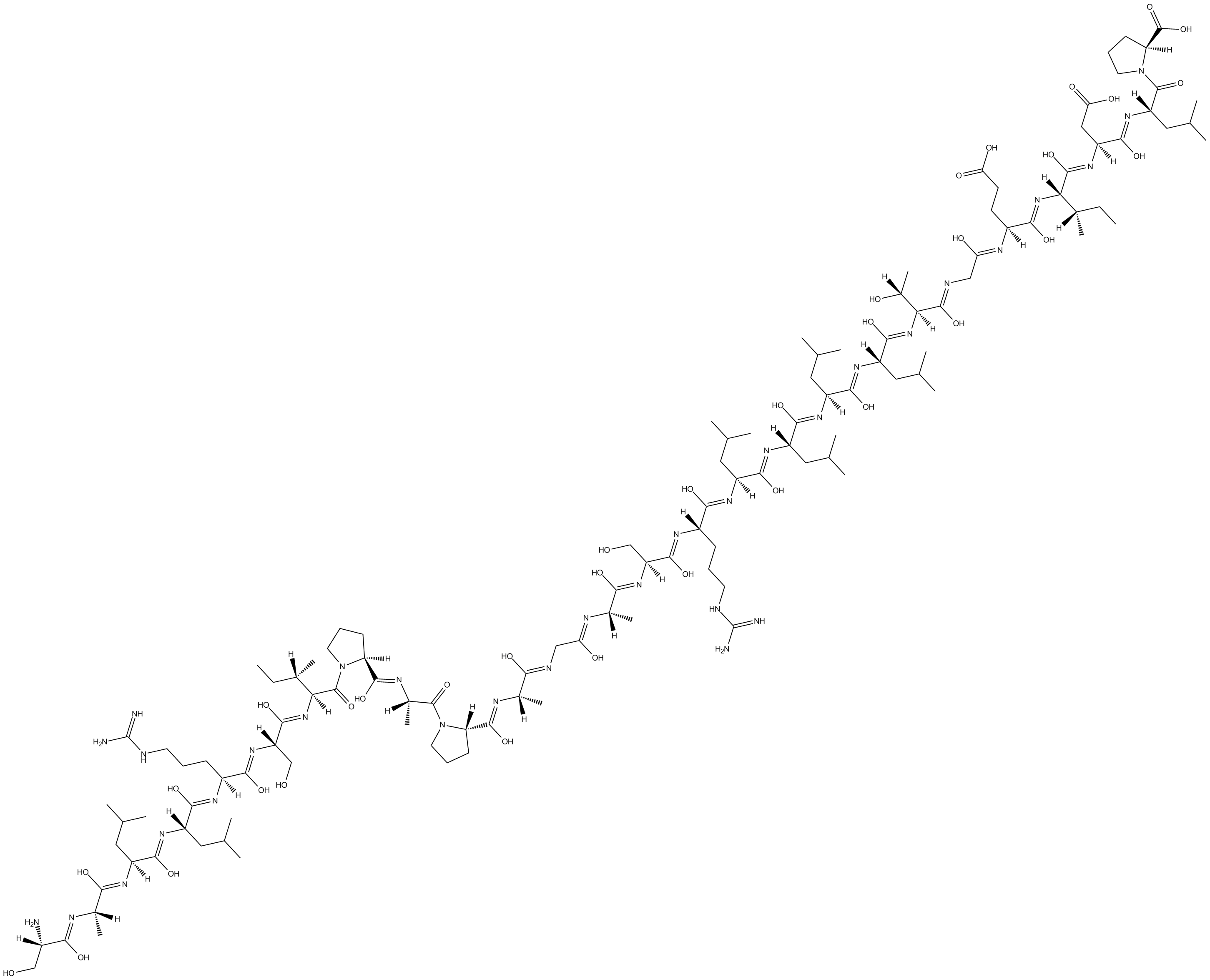
-
GC35720
Colivelin TFA
Colivelin TFA is a brain penetrant neuroprotective peptide and a potent activator of STAT3, suppresses neuronal death by activating STAT3?in vitro.

-
GC13279
Corylifol A
Corylinin
STAT3 inhibitor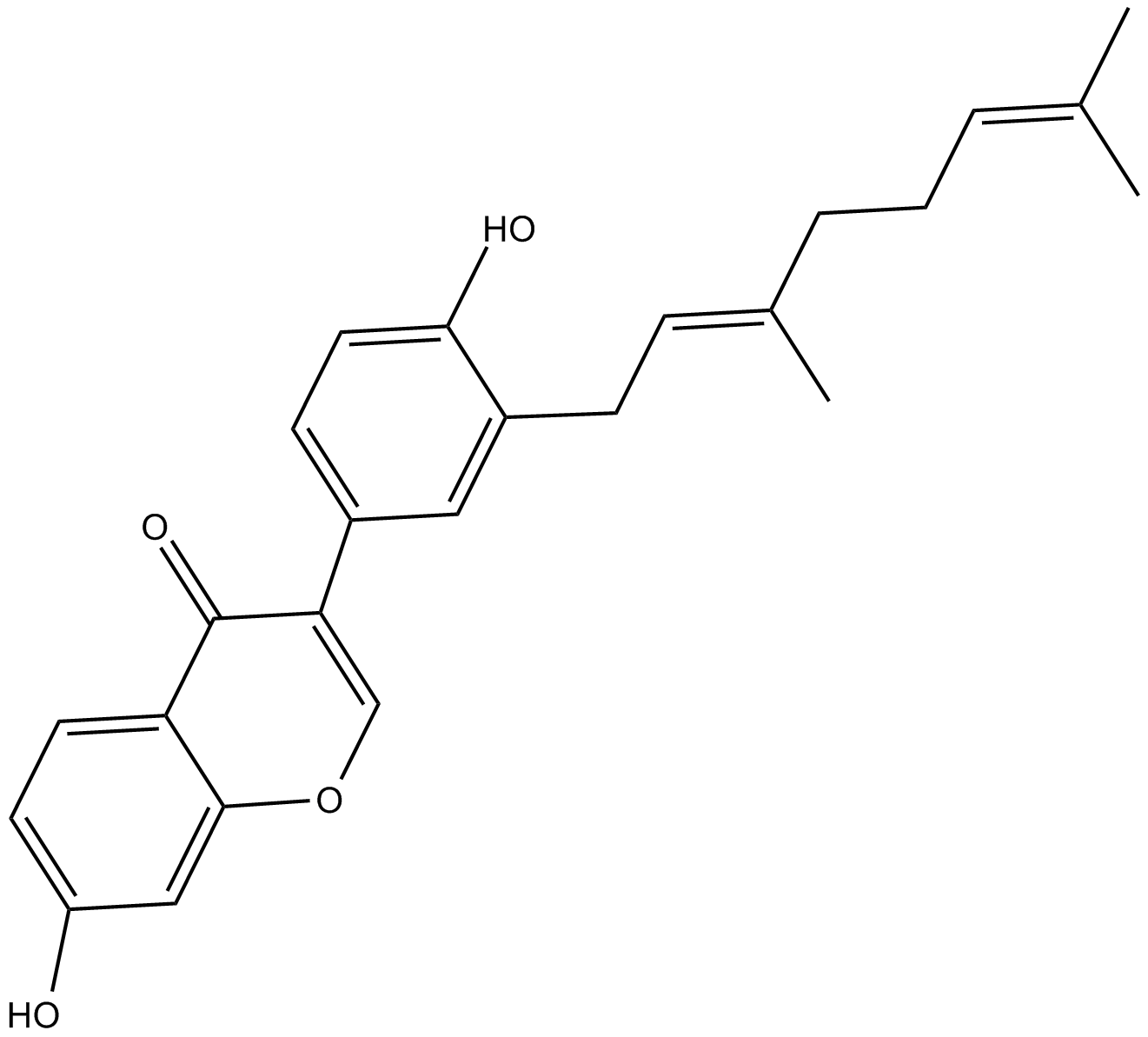
-
GC13091
CP-724714
HER2 inhibitor,potent and selective
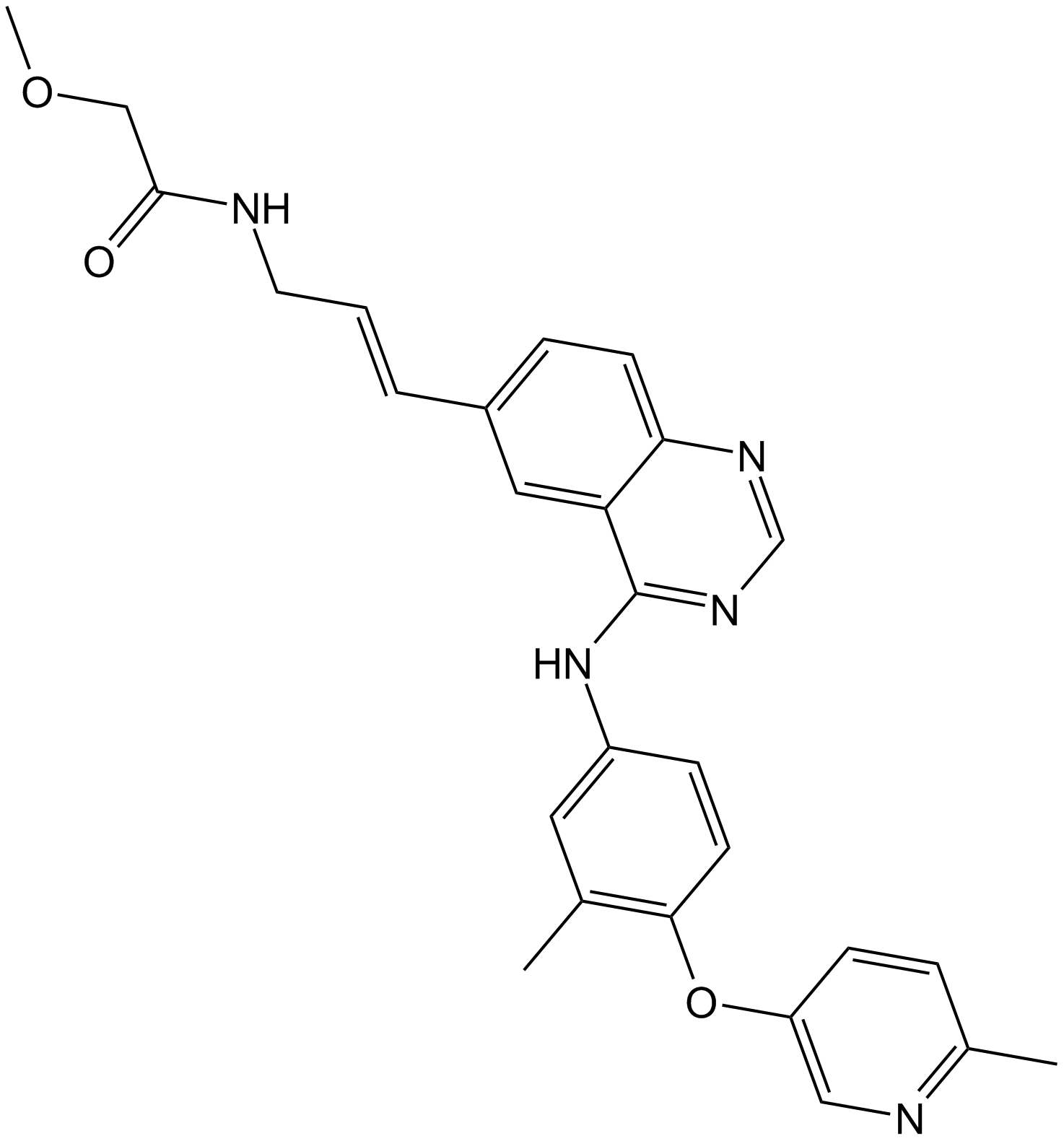
-
GN10501
Cryptotanshinone
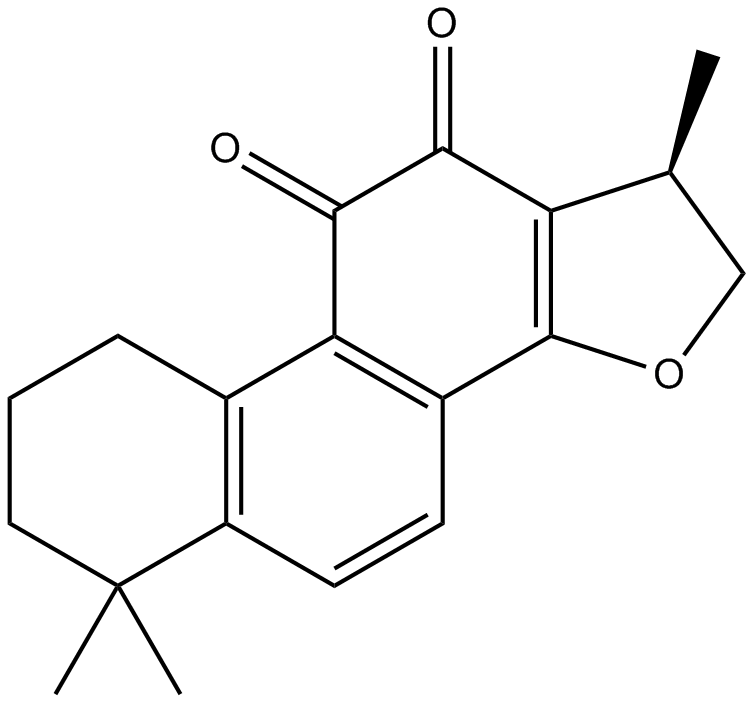
-
GC13347
Cucurbitacin I
Elatericin B; JSI-124; NSC-521777
An inhibitor STAT3/JAK signaling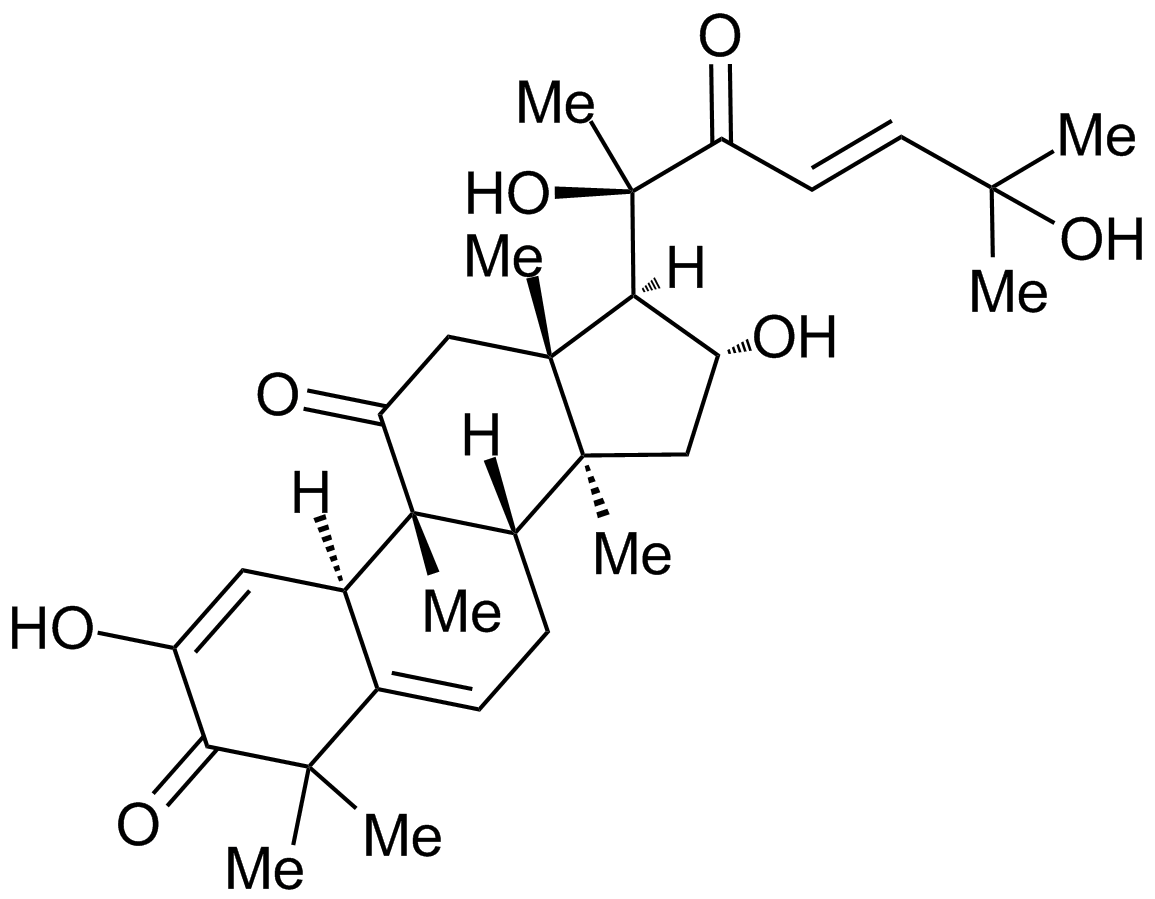
-
GN10442
Curculigoside
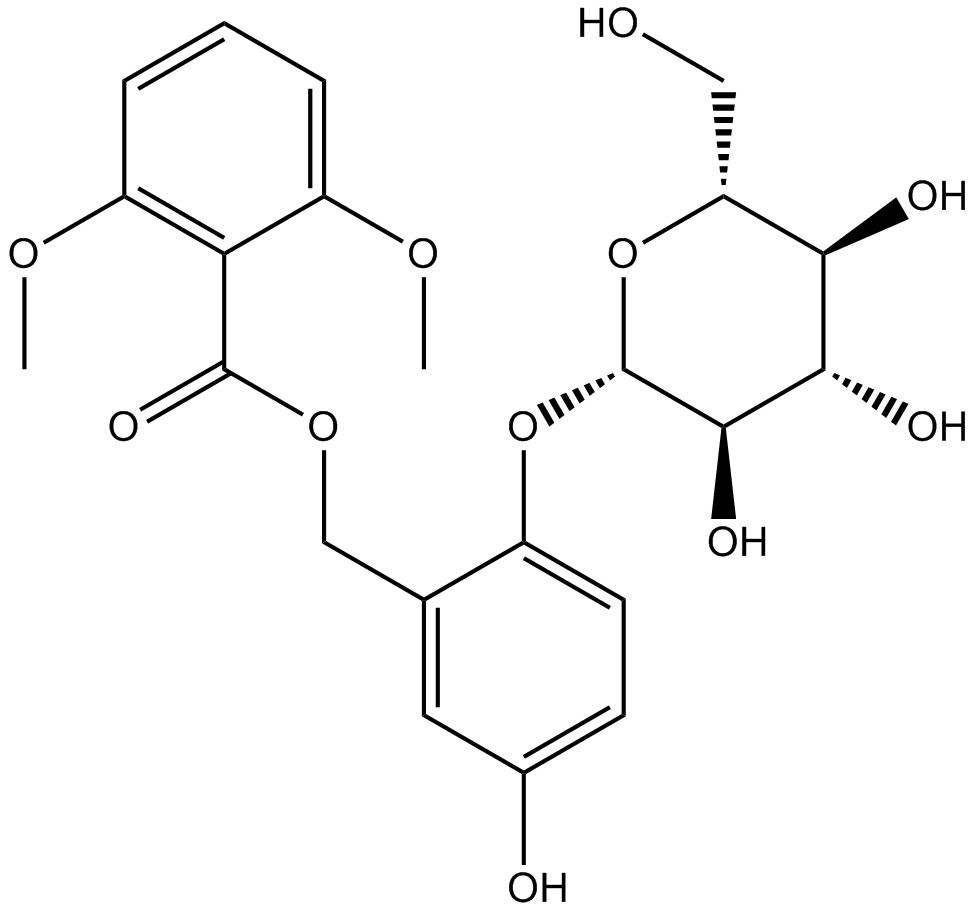
-
GC35762
CX-6258 hydrochloride hydrate
CX-6258 hydrochloride hydrate is a potent and kinase selective pan-Pim kinases inhibitor, with IC50s of 5 nM, 25 nM and 16 nM for Pim-1, Pim-2 and Pim-3, respectively.
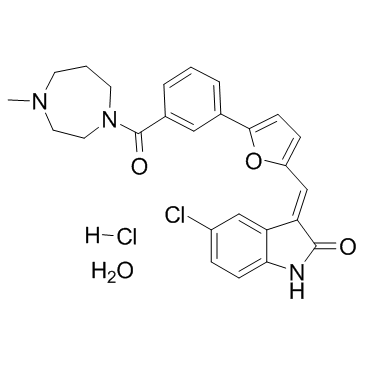
-
GC38180
Cyasterone
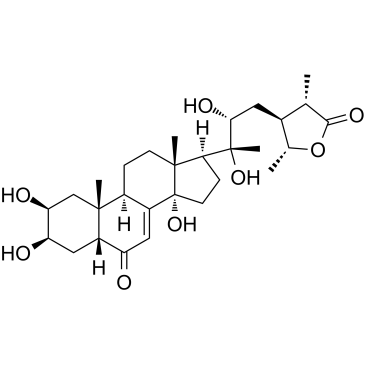
-
GC10225
Dacomitinib (PF299804, PF299)
PF-00299804; PF-299804; PF 299804; PF 00299804
Dacomitinib (PF299804, PF299) (PF-00299804) is a specific and irreversible inhibitor of the ERBB family of kinases with IC50s of 6 nM, 45.7 nM and 73.7 nM for EGFR, ERBB2, and ERBB4, respectively.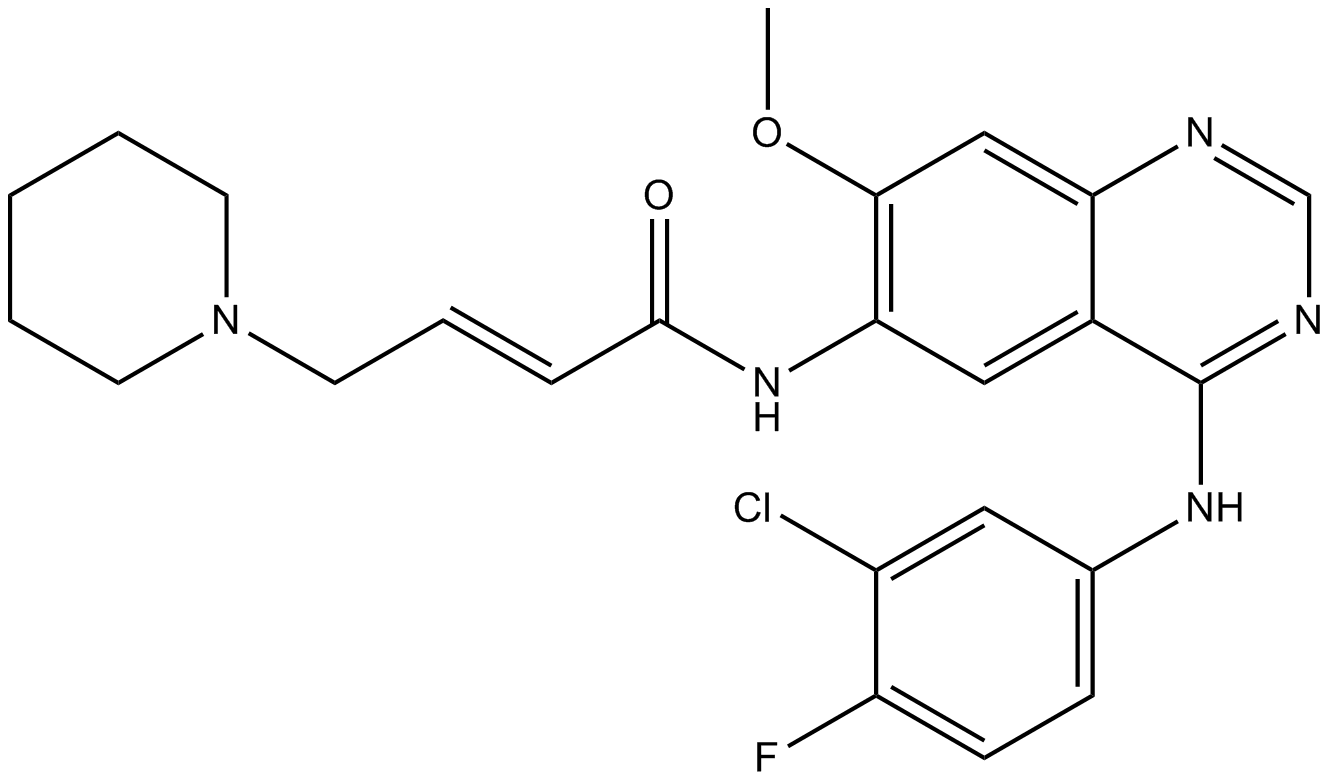
-
GC65020
Danvatirsen
AZD9150
Danvatirsen is an antisense oligonucleotide targeting STAT3 with potential antitumor activity. Danvatirsen binds to STAT3 mRNA, thereby inhibiting translation of the transcript. Suppression of STAT3 expression induces tumor cell apoptosis and decreases tumor cell growth.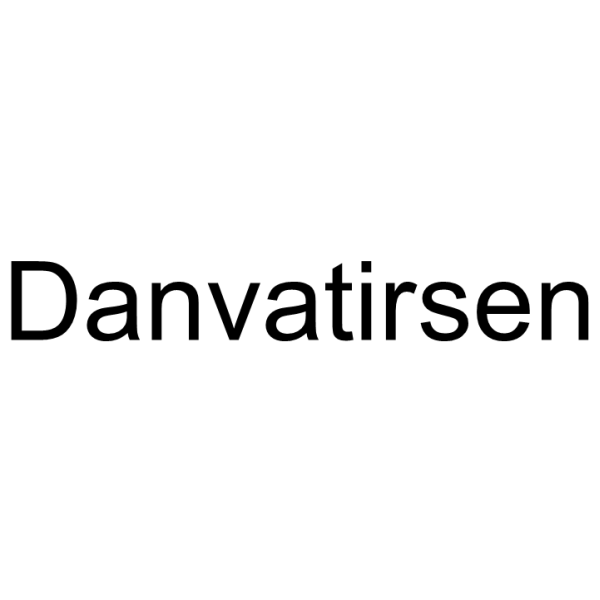
-
GC31660
Delgocitinib (JTE-052)
Delgocitinib (JTE-052) (JTE-052) is a specific JAK inhibitor with IC50s of 2.8, 2.6, 13 and 58 nM for JAK1, JAK2, JAK3 and Tyk2, respectively.
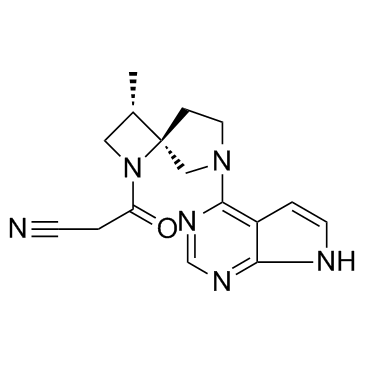
-
GC43406
Delphinidin (chloride)
Ephdine
Delphinidin (chloride) is an anthocyanidin, a natural plant pigment which serves as the precursor of certain anthocyanins that provide the blue-red colors of flowers, fruits, and red wine.
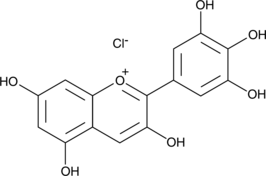
-
GC71575
Deuruxolitinib
Deuruxolitinib, a deuterated Ruxolitinib , modulates the activity of JAK1/JAK2. Deuruxolitinib can be used for the research hair loss disorders (from patent WO2017192905A1, compound I).

-
GC34101
Dihydroisotanshinone I
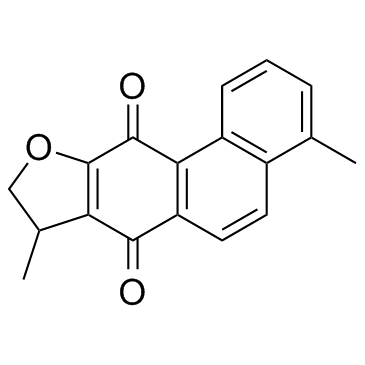
-
GN10115
Diosgenin
Nitogenin, NSC 33396, 3β-hydroxy-5-Spirostene
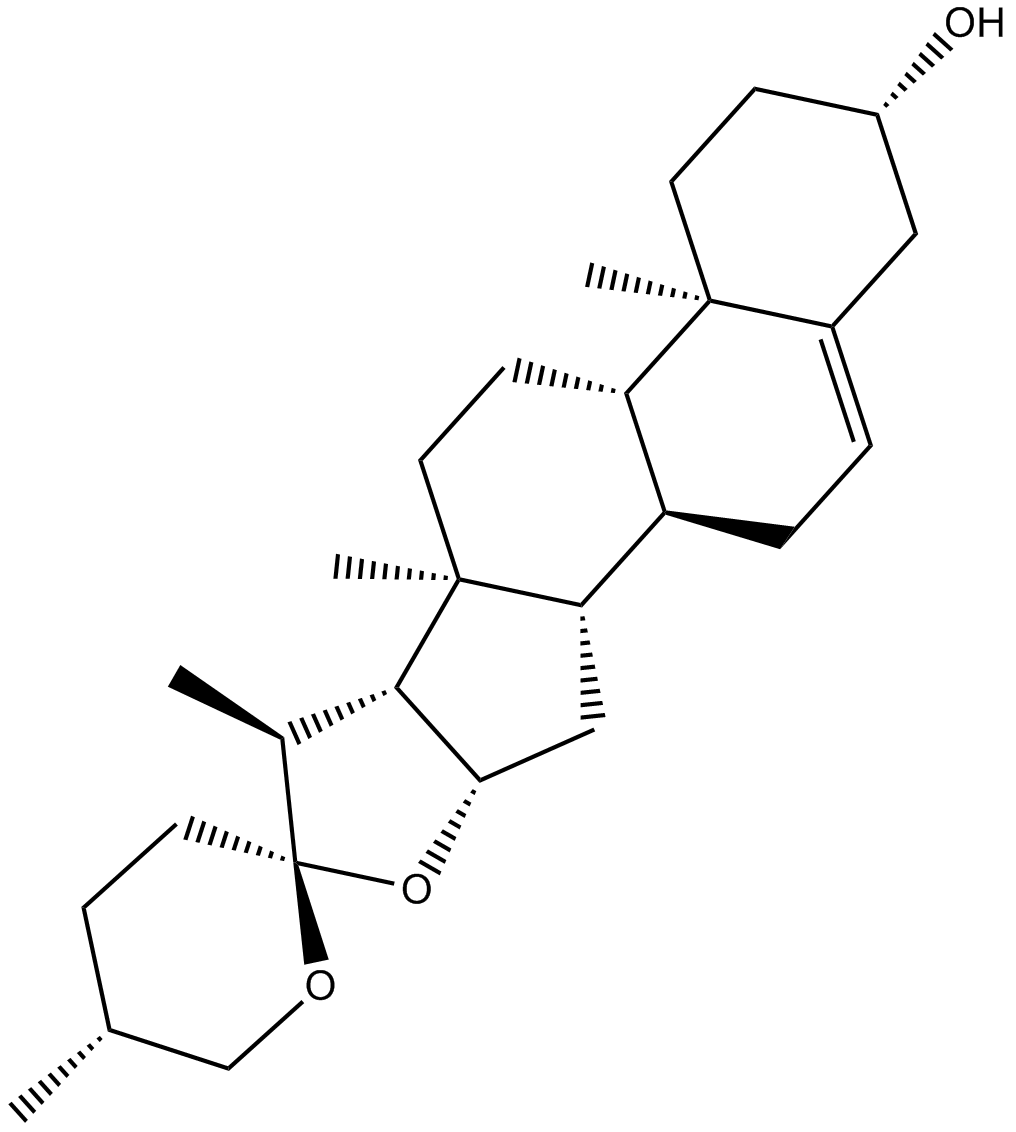
-
GC68986
Disitamab
RC48-0
Disitamab (RC48-0) is a humanized monoclonal antibody that targets HER2. Disitamab can be used to synthesize antibody-drug conjugates (ADCs), such as Disitamab vedotin.



